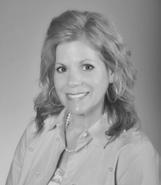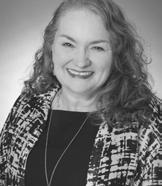

































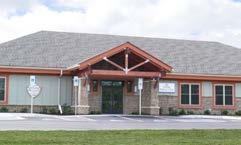



Primary Care
Annual/breast exam/ pap smear
GYN minor/complex
Surgical Services
Low risk OB
High risk OB
Birth Control
Menopause
Emergency Services*
Beverly Womack, MD
Hudson McGinnis, DO
Erin Murphy, DO
John Cuningham, MD
Jeb Fox, MD
Lindsey Shapiro, DO
Caitlin Porter, DO
Connor Brunson, MD
Toria Knox, DO
Jessica Stevens, MD
Jason Karimy, MD
Dan Moore, MD
Anna Sparks, DO
Tiffany Warren, MD
Isaac Werner, MD
Primary Care
Annual/breast exam/ pap smear
GYN minor/complex
Surgical Services
Low risk OB
High risk OB
Birth Control
Menopause
Emergency Services*
April Greene, DNP, CNM
Carrington Pertalion, CNM
Nancy Griffith, FNP, CNM
Heather Jordan, CNM OBHG Physicians
Primary Care
Annual/breast exam/ pap smear
GYN minor/complex
Surgical Services
Low risk OB
High risk OB
Birth Control
Menopause
Emergency Services*
Cecilia Grasinger, MD Heidi Robertson, FNP
Primary Care

Annual/breast exam/ pap smear

GYN minor/complex
Surgical Services
Low risk OB
High risk OB
Birth Control
Menopause
Emergency Services*
Heather Jordan, CNM









Continue reading Doris Perry Stam’s story of Lillie Dougherty with the final part in the series.
Travel back in time and half way around the world to follow the footsteps of one of the most prominent members of our rich history, John and Jacob Mast.
Meet a 21-year-old businesswomen who should be an inspiration to us all.

From Hardin Park to across the High Country, Denise Presnell is leaving her mark.

From a small group of volunteers to an organization that impacts everyone in the High Country.


A farm that is so much more than a farm.

An organization that impacts our community and encourages everyone to give back.

Gunther Jochl, President and Owner of Sugar Mountain Resort and Sam Garrett, Publisher of High Country Magazine adjust the direction of a Puma snow maker at Sugar Mountain during their first week. Sugar Mountain was the first ski resort on the east coast to open when they opened up the mountain on November 14th.
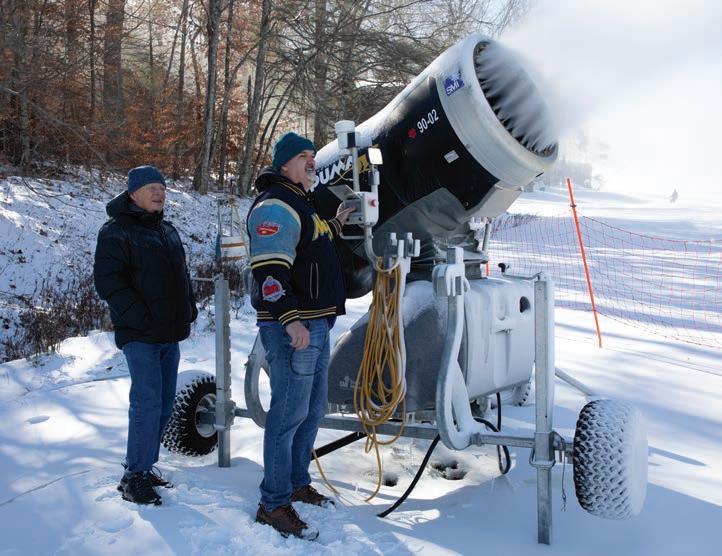
Winter is upon us! We can finally dispense with the talk of pumpkin spice whatever and focus on skiing, the holidays, snuggling to stay warm with those we love, snowboarding, gift giving, ice skating, hot chocolate, and relaxing with a glass of Balvenie 17 year by the fireplace. You may have another favorite season, but winter in the High Country is one of the things that makes me live here and love it.
Please find a cozy place to sit back and enjoy this issue of High Country Magazine, which has something for everyone. Enjoy the much-anticipated conclusion of Doris Perry Stam’s exploration into the most remarkable life of Lillie Dougherty. Join Diana White as she travels through Switzerland, following the footsteps of her ancestors John and Jacob Mast. Read Harley Nefe’s celebration of Chloe Parker, a 21-year-old business owner who was born and raised in Ashe County and has been an entrepreneur for almost a decade. Read Sherrie Norris’ story of Denise Presnell, a social worker who has touched so many lives in Watauga County. Sherrie also shares with us the amazing impact The Children’s Council has had on the High Country over the last 45 years. Jan Todd introduces us to Swinging Bridge Farm and their Trees, Tours and Tales. Jan also highlights why W.A.M.Y.’s mission inspires their clients to grow and give back. Also, enjoy a few pictures from 2022’s High Country Magazine editions as we look back to celebrate the year we took off the masks, returned to greeting folks with a hug, and processed what we had experienced and learned from the recent past.
If you have not heard, High Country Magazine will increase its publication from 6 issues to 12 issues a year starting January 1, 2023. You can look forward to the same great content, amazing photography, and more distribution locations in the new year. If you have a story idea about a person, business, organization or topic that you believe would be a great feature, please email me at sam@ highcountrypress.com. Thank you for reading and sharing High Country Magazine…and for asking for it by name!


Cheers!
Publisher Sam Garrett editor Ken Ketchie
design

Ashley Poore
contributing Writers

Diana White
Doris Perry Stam
Harley Nefe
Jan Todd
Sherrie Norris
Tim Gardner
Photogr APhers
Ashley Poore
Todd Bush
Sam Garrett - Publisher







 By Tim Gardner
By Tim Gardner
Atop feat in North Carolina High Country music annals happened this fall when four of the Boone & Church Band members, all students from here--three from Avery County High School and one from Mayland Community College---won the 95th Annual Future Farmers of America (FFA) National Convention Talent Competition in Indianapolis, Indiana.
Based in Newland, the Boone & Church Band is comprised of three high school students (Eli Church, Ethan Church and Jaxton Boone), one full-time college student (Walker Boone), another recent high school graduate balancing college courses with a full-time job (Colton Boone), plus a father (Lynn Church) who manages the group. Depending on what song the group performs, there is various vocal (from tenor-to lead-to baritone-to bass) and musical instrument switching. Those instruments include banjo, mandolin, rhythm guitar, fiddle, acoustic guitar, lead guitar, upright bass, bass guitar, dobro and piano.
The Boone & Church Band members who met the eligibility of competing in the talent competition by being FFA club members while still attending high school or are under the age of 21, not a college sophomore and still active in the club’s activities at the time of the competition, are two pair of brothers—Ethan and Eli Church and Walker and Jaxton Boone.
Walker, age 18, attends Mayland Community College and is an Avery High graduate. Ethan, age 17, is the oldest Church brother, a senior at Avery High and Avery County FFA Chapter President. Eli (age 15), the younger Church brother, and Jaxton (age 14), the
youngest Boone brother, attend Avery High as freshmen.
Ethan and Walker had entered the FFA National Talent Competition in 2021 and advanced into the Top 10. This year, Ethan, Walker, Eli, and Jaxton compiled an application with an audition video of their music in July. Then in August, they found out that they were among thirty-two applicants invited to participate in the preliminary round at the Indiana Convention Center on October 25 as the only entry from North Carolina. They advanced to the second round of 15 acts and then as one of three acts in the final round. Both latter competitions were held on the main stage in Lucas Oil Stadium (home of the National Football League’s Indianapolis Colts) on October 27 and 28, respectively, as the Boone & Church Band members captured the talent competition championship with more than 62,000 attending and a national television audience on RFD-TV.
Upon returning home from the FFA National Talent Competition, the band winners were featured in a parade and escorted by Avery County law enforcement from the North Carolina-Tennessee State Line in Elk Park to Avery High in Newland, where they attended a ceremony in the school’s commons area celebrating their championship. The Avery County Board of Education presented each of the band winners with a “Certificate of Achievement” for being National FFA Talent Champions and the Avery Commissioners adopted a resolution honoring them for their competition win that “brings nationwide recognition and distinction to all of Avery County.”
For further information about the Boone & Church Band or to book the group for a concert, call Lynn Church at (828) 467-9506.















On November 3, 2022, Casting Bread held a Celebration Dinner and Auction at the Blowing Rock Conference Center, where generous donors ensured Casting Bread can continue to increase food security for thousands of individuals and families throughout the High Country each year.
Guests had opportunities to bid on private chef experiences and local artwork, among other items. They also had chances to purchase raffle ticket entries to win decor pieces and many other treasures.

“Welcome to the 2022 Casting Bread Celebration Dinner,” said Executive Director Sam Garrett to the guests. “Tonight, we are very thankful. We are not only thankful because of so many things we’ve received, but we’re thankful that you are here. Tonight is indeed about fundraising. We have been overwhelmed with the generosity of the community. Many of you in this room provided gifts, provided things you created yourself, or donated experiences.”
This was the first time since 2019 that Casting Bread was able to host the event, and over 100 attendees participated, making the evening special by raising nearly $20,000 to help fulfill Casting Bread’s vision.

“At Casting Bread, we have a challenge,” Sam Garrett said. “We have a charter that’s been approved by the board to increase food security. We narrowed it down a little bit by saying we are going to do that by providing food, community, and compassion. We have a problem, and we have some sort of
strategy on how we are going to accomplish the goal.”
Casting Bread was founded as a closet-sized pantry in 2006 and now feeds thousands of people annually. In its free, self-choice market, people choose foods they want, rather than a preselected box. Meals served in the cafe are prepared using food from the market and seek to model healthy eating habits. As a community kitchen, all are welcome.
“One of the instrumental people in that growth was a dear friend to many of us in this room – Janet Specht. Janet passed away on October
24 after a long journey with cancer,” shared Beth Miller, Casting Bread Board of Directors Chair. “When I think of Janet, I think of someone who always saw the possible, both in situations and people. Because of that, she inspired others to see the possible also. The possible of allowing people to choose their own food when they came to a food pantry. The possible of serving lunch to volunteers and clients. The possible of a bakery to help provide funds and job training. The possible of a client becoming a volunteer and then becoming Operations Manager. And not only did Janet see the possible, but she was willing to put in the resources, time, and the talent to make it happen. She was the epitome of Casting Bread’s tagline – food, compassion, and community. She was also the epitome of a great volunteer, both here and in so many other places in our community.”
The Board of Casting Bread Ministries remembered and honored Janet by naming its annual volunteer award the Janet Specht Volunteer of the Year Award.



“I would like to talk about this young man in this room, who I have known now for over two years,” Casting Bread Operations Manager Diann Miller said. “He has gone above and beyond the call of duty of raising funds for us and giving us food.”
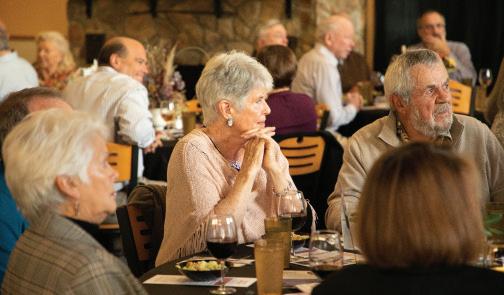
“The evening was made possible by so many individuals and businesses in the community who donated auction items, wine, and raffle items and so many volunteers. These people and organizations have increased food security in the high country. On behalf of our clients, our staff, and our board, we sincerely thank you!”
- Sam Garrett, Executive DirectorGuests listen as Beth Miller, Casting Bread board chair shares about the history of Casting Bread. More than 100 gather to celebrate the impact Casting Bread has had on the High Country. The wine pull sold out in less than 15 minutes, the bags disappeared fast. The silent auction was filled with works of art, dinner experiences and shopping sprees in and around Blowing Rock. A variety of original art could be found with something for everyone.
“Jason started a relationship with Walmart that I can’t even explain. I can’t explain how good it is,” Sam Garrett said. “We have had bins and the Casting Bread food sign hanging in our local Walmart, and the folks at the registers encourage their customers to donate food to Casting Bread. The impact of just that alone is amazing. It does more than fill up our pantry. It gives us diversity of food, and that all happened because Jason said, ‘How may I help?’ He’s been consistent. He’s been an advocate for us for the last couple of years. Thank you to Jason, and thank you to Walmart. Thank you for bringing things and surprising our clients like you can’t even imagine.”
Casting Bread thanks all the people, organizations, and companies that made the night a success.
“We feel blessed to be surrounded by so many who love and support the work we do to provide food, compassion, and community,” Diann Miller shared.
Sam Garrett added, “We are humbled everytime that we serve somebody food. We are excited to do it. And we are appreciative that you are here to help us.”
Casting Bread distributes over 180,000 pounds of food each year. Donations from generous businesses and individuals, along with the

work of dozens of dedicated volunteers, who served more than 12,000 hours last year, make Casting Bread what it is today.

To find out more about Casting Bread and help increase food security, visit www.increasefoodsecurity.org, drop off food in Travis’s Lunchbox at Boone Drug’s Deerfield, King Street, and New Market locations, or, through December 20, drop off food at Walmart in Boone.t
Angie Gregg, Beth Lyons, Bistro Roca Antlers Bar, Blowing Rock Conference Center, Blue Ridge Energy, Bolick and Traditions Pottery, Café Violette, Cara Hayes, Chef Aidan Waite, Chuck and Sue Germain, Clean Eatz Boone, Cornerstone Christian Books, Gifts & Gallery, Craig York, Dawn Stearns at Wild Birds Galore & More, de la CRUZ Farms, Earl Davis, Garnet Rose Soap Company, Georgia Hall, Gideon Ridge Inn, Greg King, Harris Teeter of Boone, Heavenly Touch Day Spa & Tanning, High Country Woodworks, J.W. Tweeds, Jersey Mike’s Subs, Karen Maugans Gallery, Log House Florist, Lowes Foods, Lynn Hill, Makoto’s Japanese Steak House and Sushi Bar, Mark and Beth Miller, Monkee’s of Blowing Rock, Mo’s Boots and Carhartt, Moss Creek Jewelry, Mountain Vista Window Washing, My Mountain Home, Najla’s Boutique, Neaco, Rachael Salmon, Red Onion Café, Serves You Right!, Six Pence Pub, Steve Pace at Bouquet Florist, LLC, Sunset & Vine, Tazmaraz Boutique, The Gilded Lily by Patra, The Mustard Seed Market, The Rug Company, The Speckled Trout Restaurant & Bottle Shop, Town Tavern, Vera Bradley, & Walmart

As the year 2022 comes to an end, High Country Magazine would like to remember the individuals, organizations, businesses, and events that have made this year one to remember. All of the interviews we conduct, pictures we take, and stories we write would not be possible without people being so willing to share their passions with us. Here are some of the stories from across the High Country from the last year that we want to highlight.

The streets of downtown Boone came alive with thousands of people enjoying performances and activities at the inaugural Boonerang Music & Arts Festival in June. “The inaugural Boonerang Music & Arts Festival was a resounding success,” said Mark Freed, director of cultural resources for the Town of Boone. “Our community came together in every way – from the staff and presenting partners to the amazing volunteer crew; from the production companies, artists and organizations; and of course to all of the people for showing up and having a great time.”



From starting the Sundown Times at the age of 22 to selling High Country Press Publications in January 2022, Ken Ketchie reflects on nearly 45 years in the High Country’s media industry. “Presenting the local news, facts, and entertainment has an impact,” Ketchie said. “Presenting history and profiles of people has helped others understand the many different individuals who have built our mountain community. I like to think we’ve played a part in helping individuals understand and make decisions about issues in our area.”



For the past 19 years, Rachael Salmon has been selling her nature photography at the Watauga County Farmers’ Market. “I’ve been capturing photos for most of my life, and I always thought that I was going to forget important moments,” Salmon shared. “Cameras will always capture more details than our memories, which is why I’ve always been drawn to photography.”



Anniversaries are the perfect time to reflect and imagine, and the 150th anniversary of the Town of Boone is the perfect time to reflect on the organizations, people, and characters that established and advanced the town including several churches that are at least 100 years old. There are many achievements our oldest faith communities have made and continue to do so today.

Ashe County Middle School educator
Charlene Horton encourages her students to dream big. With the help of NASA and SpaceX, her students learned what reaching the stars looks like by experiencing an opportunity of a lifetime. A group of chosen students embarked on the ultimate space exploration journey traveling to the NASA Goddard Space Flight Center in Maryland in May.


Carlton Gallery in Banner Elk celebrated its 40th anniversary this year. Toni Carlton has provided a place for artists and art lovers to find each other over the years. She shared her story saying, “It’s hard for me to believe that I made it to 40 years because it has not always been easy. I never had any idea that I was going to have a business; it wasn’t a plan. My life passion has always been art though. There’s just this drive that carried me.”

Hidden Happiness Bee Farm, located in western Wilkes County near the Watauga County line, promotes a balance between commerce, education, and community. Owners H.S. and Kathy Greene, who have been married 30 years, serve as the area’s greatest advocate for some of nature’s hardest workers.



Grandfather Mountain fully opened its Wilson Center for Nature Discovery, a place where learning comes to life, in July. The project nearly doubles the size of Grandfather’s established nature museum, with 10,000 square feet of education space — including the exhibits, three classrooms, an ADA-accessible theater and event space for conferences and community meetings.

Novisit to West Jefferson is complete without taking a quick photo with the massive metal cows at the Ashe County Cheese — along with a trip across the street to shop for cheesy merchandise. From fondue sets to local wine accompaniments to cheese knives to a bag of curds, the retail outlet store offers a large selection of cheese plus other treats to make visitors’ days the cheesiest.

Somewhere over the rainbow — at an elevation of 5,506 feet in Eastern America’s highest incorporated town of Beech Mountain — there’s a place like no other that comes to life every September. While the mountainous terrain of the High Country hardly resembles the flat plains of Dorothy Gale’s back yard in Kansas, the unique atmosphere of the location of the Land of Oz makes the adventure of meeting wellknown characters like the Scarecrow, the Tin Man, and the Cowardly Lion unforgettable. The Land of Oz only holds its annual Autumn at Oz Festival across three weekends each year, making it much more special.

Tom Lanier celebrated his 50th year in broadcasting, with 32 years in radio in the High Country plus years of freelance work as an on-camera television spokesman and voice talent for commercials, training films, corporate videos and television shows. At age 76, Lanier still spins the tunes as the morning host on Classic Hits 100.7 and 99.1, perched beneath the “On the Air” sign in the Curtis Media Group studio in Boone.


Between the late 1980s and 2013 in Boone, two women served as mayors in during the town’s and Watauga County’s period of most rapid growth. Velma Burnley (1921-2019), Boone’s first female mayor, was elected in 1989 and is the longest serving to date, with 16 years in office. Loretta Clawson was named Burnley’s mayor pro-tem beginning in 1999, holding the position until Burnley retired in 2005. She was then elected as Boone’s next mayor, serving two terms from 2005-2013.
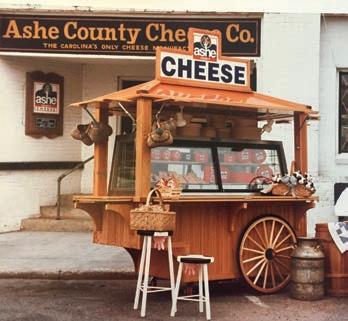



Lillie Shull Dougherty must be considered one of the founders of Appalachian State University, as Doris Perry Stam has shown in the five segments of her six part story featured in High Country Magazine this year. Lillie’s husband, Prof. D. D. [Dauphin Disco, or Dauph] and his single brother B. B. [Blanford Barnard, or Blan] have been lauded for establishing Watauga Academy in 1899, which became the state supported Appalachian Training School in 1903, and eventually Appalachian State Teachers College in 1929, and Appalachian State University in 1967.
But it is time to shine the light on the other Dougherty, the woman behind two men, who not only taught school with them from the very beginning, but became Business Manager and Treasurer, provided music for the school, organized hospitality and hosted countless events, and, as a working mother, provided a home for her family and her brother-inlaw. These multiple areas together create an unmistakable, though heretofore unnoticed, impact on the school and the town of Boone.
As we celebrate Boone’s 150 years, we cannot help but celebrate the vast influence of this woman. In this final part 6 of Lillie’s story, Doris Perry Stam wraps up her long article by asking the question, “What would AppState be like if there had been no Lillie Shull Dougherty?” and by considering the lasting, often unseen, contributions of Mrs. D. D. Dougherty.
The entire piece written by Doris Perry Stam will be available on our website in mid-December, including her hundreds of footnotes which indicate the depth of Ms. Stam’s research about Lillie Dougherty. Please look for the notice about how to locate
the article “Lillie Shull Dougherty: Co-Founder of Appalachian State University,” which will be permanently located on our webpage. We hope you have enjoyed reading this biography of a most remarkable woman.
The Dougherty home, built in 1902-1903, was no mansion. The simple two-story home, which Lillie helped design, was a typical in farmhouse at that time. The Architectural History of Watauga County North Carolina states: “A historical photograph shows it with a two-tone paint scheme and its original porch posts with sawn brackets. The original porch had three sets of steps in line with central and flanking entries, an unusual entry arrangement that bespoke the house’s role as not only home to the Dougherty family, but also a reception and lodging place for official visitors to campus.” Because of the generous water supply from springs on the hill behind, the home was one of the first to have running water when built. The moss-covered rocks surrounding the spring behind the garage created a well-known refreshment to many. The west end of the front porch was enclosed to create a room. By 1915 a toilet was installed in a small room built by the kitchen door, accessed outside from the porch. The kitchen wood stove had an extension into this room to heat water. Until then it was chamber pots or the privy outside even though the sink had running water! Wood stoves and fireplaces provided the only heat until after 1919. A remodel was done of the kitchen and dining room in 1918, which was the same year that plumbing was added to the women’s campus dormitory. Prior to and after the death of B. B. Dougherty in 1957 the house was occupied by daughter Annie Dougherty Rufty and her husband Roy and stood on the campus until 1988. When expansion plans were announced by AppState, the structure was saved from demolition by a community effort and moved to storage at the school
owned State Farm Road property. In 1989 the home was purchased by Wayne Underwood for $10 from the N. C. Department of Transportation just before the house was scheduled to be burned. With the help of community donations, the house was restored and now stands at Mystery Hill on the Blowing Rock Road as the Appalachian Heritage Museum.
Quarters were tight in this family home with Blan taking one bedroom, four children upstairs, sometimes a cousin or grandchild living with them and attending high school, possibly a boarder to help with the workload, and the continual flow of family and college guests. No long-standing fine president’s home can be found on the campus to give testimony to early days, as at many colleges and universities, such as at East Carolina or Chapel Hill. In fact, the Dougherty insistence on economy allowed for no fine buildings of lasting quality to be erected anywhere on campus.
When the family relocated in 1903 into what became their long-term home, Dauph never intended this house to be a permanent residence and always wanted a finer abode for his wife; that opportunity never came. He recognized the modesty of the home did not match the dignity of the many events Lillie hosted, nor did the home afford lasting privacy. Simple family time did not exist in such a busy household, nor had it in the Meadow View crowded boarding house where they had lived for four years with a toddler, B. B., plus ten students beginning in 1899. The quieter, less public life she and Dauph sought always remained elusive.
Yet this family home served well and was a venue for countless
Both my parents and all four grandparents are from Watauga County, and as a young child I thought I might die of boredom talking to old people in the mountains. I wanted to ride the horses or go swimming! But now I treasure the time spent hearing stories from the old timers. Even though I grew up in Greensboro we were in the mountains an awful lot visiting relatives. I went to summer camp here and have hiked many a hidden trail. At Young Life club I met Chip Stam and followed him to Chapel Hill where he was a Morehead scholar (-I gotta’ boast a bit!). The love of my life was my husband for 36 years until his death in 2011. We have three children: Michael, Martin, and Clara. After studying vocal performance for a master’s Notre Dame I earned a master’s in theology from the Southern Baptist Theological Seminary during the years when my husband was a professor at these schools. I’ve been a music, art, and classroom teacher for 43 years in 3 states and overseas, and currently teach piano at my home in Durham. I have a passion to research, preserve and honor the early history of AppState. When not at my computer or reading, I play tennis, ride horses, swim, walk my goldendoodle, garden, serve with my local church, and enjoy my family and five grandkids. The mountains are always calling to me, and I get to Valle Crucis and Boone as often as I can. t

special occasions. Even Lillie’s expansive front yard was the setting for receptions and reunions, where chairs were brought for seating under the large mountain catalpa “cucumber” tree. My parent’s wedding reception was held on the front lawn in 1943. Millstones from the Dougherty mill, which stood nearby, were made into a small table that stood under the large tree canopy, a reminder of times past. Her large garden and berry patch by the house provided some of the party and family food; her beloved flowers provided beauty and color.
In this home Lillie experienced the joys and sorrows, as well as the private pressures of life. Here she birthed four of their five children and mourned the loss of their 2-year-old son, Disco, from diphtheria, while her granddaughter, Virginia, and her brother-in-law, Blan, continued to struggle with the same illness at the same time in her home. Weakened by the extra exertion of caring for the sick, Lillie later experienced several months of depression. She was no super-human but experienced the range of emotions that come with the ups and downs of life.

Here in this home, she and Dauph tried to keep their restless teenager Clara secluded from the pursuits of her classmate, a poor mountain farm-boy, encouraging her painting and music
skills to blossom while trying to focus her on her high school studies. Upon receiving the news that Clara and her sweetheart had eloped in Tennessee, several people outside the family witnessed a distraught Lillie pacing the front porch of the house in her bathrobe sobbing.

When they eloped Clara was only 16, and Lester was 19, neither having graduated from high school. Their youthful marriage resulted in the joys of many grandchildren for a young grandmother who insisted, at the age of 40, on not being called “Grandmaw.” “Mama and Papa Dougherty” were the new names settled upon. My mother, Lillie Brown Perry, who died recently at the age of 98, was the third-born of eight children and named for “Mama Dougherty”. Clara and Lester, my mother’s parents who had eloped, lived in Meadow View, the boarding house and home built for Lillie in 1899, and worked on campus. After a few years, in 1920, they moved into and were put in charge of

the newly built boys’ dormitory, Justice Hall, which stood near the Dougherty homeplace, with the family farm between them. My mother spent many happy times with her grandparents and recalled joyfully running and playing in the large front yard and playing the big square piano in the parlor, which spurred her on to a career as a church pianist and organist.
Most summers and holidays were spent by Clara and her children with the grandparents at this happy home back in Boone, my mother said, even after her father, Lester, became a pastor and the family moved downstate. My mother treasured memories of helping “Mama Dougherty” in her Business Office during summers and being entrusted to walk uptown to the bank by herself with the daily deposit.
Not only were there grandchildren which Lillie, Mama Dougherty, helped to care for, and nieces and nephews often living in the house, but Lillie also had two difficult teenage boys of her own at home when Dauph died at the age of 59. Soon to be age twenty, son Barnard would mature to come alongside his mother as Assistant Business Manager, learn the ropes, essentially the family business, and take over as Business Manager in 1938 when Lillie retired. Edwin, last-born, would later join the faculty of Appalachian as a professor of history.
Homemaking had many facets for Lillie Dougherty; she was pulled in so many directions, and she was called upon to care for so many. Two of her sisters died leaving children which Lillie sometimes had in her home; aging, ill, or impoverished extended family from all sides found a place under Lillie’s care.

Rarely did she ever leave Boone. As far as is known among her descendants, her travels included her honeymoon in Nashville, a visit to her parents in Butler once every year or two, and once to help daughter Clara after childbirth in a mill town near Charlotte where Lester was pastoring. Her priority was always her husband and their cause. At the surfacing of any challenging situation, what she valued was immediately evident to all. Her children and grandchildren told stories of hearing Lillie exclaiming, “The School, the School!” — always the priority.
She tried to ease the pressures on Dauph when the school was threatened with closure by the legislature and by Governor Locke Craig in 1910, 1913, and again in 1915. (Craig wanted one Normal School in Western North Carolina in his home area of Asheville and tried to shut down both Appalachian and Cullowhee/Western Carolina to establish one consolidated mountain teacher training center.) Lillie sought to encourage Dauph when he was sometimes in Raleigh during World War I, and when he headed the war effort in Boone as Watauga County Food Commissioner. During the ensuing pandemic, Lillie worried over Dauph who took responsibility of taking food to dangerously ill and quarantined Clara and Lester, while she cared for Clara and Lester’s two little girls. Lester had caught the Spanish Flu while quartered with hundreds of men
working for the U. S. Postal Service in Washington, D. C. After being sent home on the train with the flu, Clara contracted the contagious illness from her husband and miscarried a child during a month of high fever. Every year held challenges for Lillie coming alongside her husband, with Dauph constantly responsible for teaching, school finances, expansion, building projects, and lack of funds.
Lillie, ever her husband’s supporter, encouraged Dauph to attend graduate school at Peabody College, Nashville, Tennessee. He studied at Peabody in 1924 as preparation for leading the school through state mandated changes that would see Appalachian become a Junior and then a 4-year College. His health began to show the strain. Scaling back his work, he stopped teaching classes in 1924, and concentrated on the business of the school. All this was transpiring while their two sons were yet young, and countless hosting of grandchildren, extended family, and countless guests continued.
In May of 1929 Blan wrote a letter explaining his absence from an important meeting in Raleigh and exposing some of
the hard times faced by the family: “Since last January I have suffered as no man ever did. … my brother [Dauph] remains very unwell. He is unconscious almost all the time. His wife [Lillie] also has been very ill; his daughter [Clara] is just from the hospital in Greensboro where she underwent a serious operation; our sister has also been for days and weeks lingering between life and death. We had our time with 150 cases of flu in the school. I am now up many times every night, try to sleep a little, it is very little.”
Dauph died on June 10, 1929, at home and having heard the bell from the school ring just before he passed, signifying that the school was now

Appalachian State Teachers College, a 4-year college, at last. Lillie was now a widow. Being a widow myself, for 10 years as I write, I can attest to the blur of activities and new responsibilities that came to me upon the death of my husband, and the ever-present longing for your loved one, as well as the steadying calm that can come from an earnest Christian hope of a future without death or sorrow.
Life goes on after the death a family member. Sharing her home and caring for others was a constant part of life for Lillie. Evident to her friends and family was her deep satisfaction an joy in loving and serving others in this home.
After her husband died Lillie continued to care for Blan. She was essential for him to function in his expansive role as President. As long as she was able, she kept watch over her

brother-in-law’s personal appearance; image consultant could be added to Lillie’s posthumous job description. If she had to stop him as he was leaving the house he would usually say, “Oh, I’m just going to my office and won’t see hardly anybody.’ But she knew better and saw to it that he was dressed suitably for meeting any and all he might see during the day.”
To her brother-in-law, time meant little; his big silver-cased watch often went unwound, making him miss family meals. “Unless he brought a guest home, he might take a cup and go to the [cooking] pots to get his food,” or in later years help himself to food in the refrigerator, setting his dishes anywhere in the house when he had finished eating. Vegetables and fruit were the main diet for Blan, a man with a simple appetite, a sensitive stomach and picky eating habits. Sometimes without advance notice, he would bring a friend or two for a meal, not appearing to realize that it was an embarrassing situation as well as an occasion for more work for his sister-in-law. And all too often it meant the changing of her plans altogether or

the leaving off of something she wanted and needed to do around the house.”
When sickness came upon the family, Lillie tended not only to her husband and children, but also to her brother-inlaw, whose constitution was not strong. He lived in the apartment-office over the garage after Lillie and Dauph’s children left the home, but Lillie still fed and in a general sense took care of Blan until she died in 1945. He outlived her by 12 years, and he outlived his brother by 28 years.
The Biblical Fruits of the Spirit: love, joy, peace, patience, kindness, gentleness, faithfulness, and self-control, were surely things Lillie sought to cultivate in her life. Family and friends have testified that it was her steadfast faith and trust in God which energized her for service with patience and kindness. Lillie’s daughter-in-law Grace Dougherty, wife of Barnard, told others that it was Lillie’s habit to place extra food or leftovers in the windowsill of the kitchen for those in need. Grace thought that John Adams, who became an employed

assistant to Lillie in the 1930s and 1940s, may have become acquainted with the Doughertys in this way. John Adams, an African-American, not a Boone native and possibly illiterate, lived on the family property as a welcomed and needed helper.

Clara helped her husband Lester write the book B.B. Dougherty: A Man to Match His Mountains, and in it he included a chapter about her mother Lillie. Here is description of some of Lillie’s community service and leadership: “Her devotion to and work for her church, the First Baptist, was next to that for her family and Appalachian. She was called upon to serve in various places and she always found time to do a good job in whatever she undertook. The outstanding contribution she made to her church was in the capacity of president of the Woman’s Missionary Society for some twenty-five years. Time and again she was re-elected to the office over her protests, but the society was unwilling to let her go because of her able leadership and her superb personality.”
Clara and Lester wrote: “Church workers always found a welcome at the Dougherty home and a sympathetic interest in their labors. Some of these people were top men in the Baptist State Convention. Frequently when a revival or other important meeting was in progress at the church the visiting pastor and several other workers would eat together at the home and discuss their work with both Professor Dauph and his wife. For
a long time the home was regarded as a mecca for such groups.”
“Until her health began to fail in the late ‘thirties, Lillie was Appalachian’s hostess. Men in high educational circles, including state superintendents of public instruction, were entertained in the Dougherty home. Not infrequently the commencement speaker was among guests, for in those days it was not the custom to send visitors to a hotel. Many others came on school business and remained for a meal or two it not for the night.”
Hospitality was instinctual to Lillie and part of her chosen and expansive service as homemaker. Lillie Dougherty’s functional hostessing, feeding and entertaining of guests strengthened relationships with the college and the community.
As I have tried to demonstrate, Lillie Shull Dougherty was the unseen, and unsung, influence of the first 45 years of AppState. With some speculative imagination, consider if Appalachian had been founded by one person, B. B. Dougherty; if he alone had begun Watauga Academy; if Dauph and Lillie had decided to stay in Butler, Tennessee? Would B. B. Dougherty have been able to sustain Appalachian as a one-man show -- a bachelor -if there had been no brother and no woman to help?
No one could have had the time, or tenacity, like B. B. Dougherty, to spend months each year in Raleigh attending legislative sessions fighting for school appropriations, and to
hobnob with the rich and powerful to slowly secure funding for Appalachian. His fierce determination to extend North Carolina public education through tax equalization might not have come to fruition by 1929 with the Hancock Bill.
Although he continued to regularly visit his life-long sweetheart from Lenoir, there was no time for marriage. Blan was too busy to marry and was essentially married to the college. Surely a team effort helped the school to run smoothly, and the softening presence of a female was not insignificant.


The stabilizing influence of a homemaker cannot be overlooked. Lillie provided a home for both brothers; a loving, lovely, clean, and comfortable environment. These brothers were “temperamentally opposites,” yet in their own ways both were dependent upon this woman.
Son-in-law Lester Brown wrote: “Professor Dauph, …was a large man who resembled the robust, hardy Dougherty forebears more than his brother. He possessed great energy of both mind and body, and so was an active somewhat restless man. He was not well satisfied unless he was deep in study or engaged in work.”
Rev. Bradshaw, college classmate of Dauph’s, contrasted them in his message delivered at the Memorial Service for D. D. Dougherty on the Appalachian campus in October 1929, four months after Dauph’s death. Bradshaw said: “They were different in almost every detail of life, … although so different, and often times they did not agree, they had absolute faith in, and were deferential always to each other.”
Could they have worked together without her? Blan, thin and wiry, was soft-spoken, quiet, and patient. Dauph, a large and robust man, was warmspirited and at times quick to show his anger, though a quick and hearty laugh came easily to him. His sense of humor helped to buoy him. Both were totally and stubbornly indifferent to the opinion others had of them. LeVerne Fox, who grew up on the campus where his father worked as plumber, carpenter, and painter described Blan and Dauph during the 1920s as “very “colorful”, alive people, different as ‘night and day.’ Dauphin Dougherty … reminded
me of “Santa Claus” as he was “very jolly” and friendly.” … “Now, “Blan” Dougherty, the other brother, was completely different,” commented Fox.
The brothers, along with Lillie, shared one bank account and each freely drew from it as needed. These three jointly owned properties. The two men did not always see eye-to eye. Though no one ever saw the brothers differ in public, might Lillie have been a crucial unifying factor, the glue, the peacemaker?
If Lillie Shull Dougherty had not been part of Appalachian would there have been an important lack of beauty? Of music? Western Carolina did not have a music department until 1935! Appalachian has always had a strong music program through the decades, particularly in training of music teachers. Would this have developed without that initial influence from Lillie?
No one will ever be able to quantify to what extent Appalachian benefitted from Lillie Shull Dougherty. She shared in the self-denial, long hours of work, dreams, disappointments, and triumphs of Dauph and Blan Dougherty. After her husband’s death she continued to carry on at the college in the same spirit that had characterized their work through the years. Lillie showed a deep commitment to Dauph and to their life-long work at Appalachian.


As I consider my great-grandmother Lillie I see an
unwavering Christian faith, tempered with endurance and common sense. It is interesting to me to ponder how she endured so many hardships and losses, and to observe in her an inner strength of character through them. I wish I had known her, for her daughters all spoke so highly of her. The example of her love for her husband, through thick and thin, was obvious to all who knew Lillie and Dauph and is an enduring thing I treasure as I wear her simple gold wedding band. With obvious focus and faithfulness, she shared with Dauph and Blan an abiding love for young people and a belief in the edifying value of education for individuals and society. The total devotion to the cause of education for the mountain people is unquestioned.
Whatever recognition the Dougherty men may have received for their accomplishments, it must be acknowledged that Lillie Shull Dougherty’s skill, understanding, and faithful labor, in every challenging situation they faced, was a factor for good. We have heard the quip “Behind every successful man is a woman.” For Appalachian it was one remarkable woman behind two remarkable men.
The life of Lillie Shull Dougherty cannot be measured solely by her visible achievements or official jobs as teacher or business manager, or her informal roles as hostess and homemaker. The foundation of all her work was her steadfastness of purpose to serve the school and the integrity of her character in doing it. For this she is worthy of honor. t




The Mast family in North Carolina can trace its roots back to John Mast who arrived in Philadelphia on November 3, 1750. John (age 10) and his older brother Jacob (age 12) traveled with four sisters and their Uncle Johannes Mast. It is not known what happened to the parents of the six children. The family were Amish-Mennonites and it is assumed that they came to America because of religious persecution. The family had lived for several generations in the town of Guggisberg, Switzerland which is about 30 km. from Bern. Then they moved to Le Hang in the Ste. Marie-aux-Mines region of France for safety before they left from Rotterdam on the ship Brotherhood. The family settled in northern Berks County, Pennsylvania where many other families had settled from their area of Switzerland.
Their peaceful life away from persecution was changed dramatically in 1755 with Indian uprisings. The land that Jacob and family had selected was considered by the Delaware Indians to be their land. Jacob and his family moved to the southern part of Berks County. Later he became a Bishop in the AmishMennonite Church and raised his family in Pennsylvania.
John met his wife Barbara in the late 1750’s and was part of a large group of Mennonites who traveled south in 1762, settling in Randolph County, NC. They probably had wagons loaded with what they would need to start their new life, and many walked most of the way. They became part of the Uwharrie Dutch Community.
The people in this group were pacifists and were in danger of losing their property because of not swearing an oath of allegiance to the State of North Carolina. With these issues plus flooding in the land in Randolph County, the Mast family split into two groups – one going to what is now Watauga County and the other going to Ohio.
I have always been so interested in my ancestors and fascinated that John Mast, my 5th greatgrandfather, “walked” to North Carolina. I have done research and read many articles on the family. One dream was always to go to see Guggisberg, Switzerland where the family came from.
A number of years ago I found that a descendant of Jacob Mast, Lemar Mast and his wife Lois Ann, own a bookstore and publishing company in Morgantown, PA. They have led many tours to the area of Switzerland where the Mennonites/ Anabaptists came from. I was so fortunate to find out they were leading a tour this year and the focus would be on the Mast family. Each tour focuses on
one family, but many other families are included and locations that are visited often pertain to many families.
There were 43 people in this tour group, and everyone was very interested in their ancestors and learning about life in Switzerland in the 1700’s. We shared family trees and found many connections through various family lines. There were 13 of us who descended from the Mast family.
What would John and Jacob Mast be thinking if they knew that 272 years after they left for America and a whole new life that some of their descendants would be traveling back to where they came from? How difficult that had to be for them to leave all they knew and their family, knowing they would never return. They had no idea what challenges lay ahead for them and what their lives would be like. But they left with a deep faith in God, knowing that they were not alone in their journey. Now so many years have passed, and the family tree has grown more than John and Jacob could have imagined. And we went back to honor them and their adventuresome spirit and to give thanks that we can carry on their legacy.
It was truly a delight to drive in the country with the expanse of green fields with cattle dotting the hillsides to get a true feel for life in Switzerland.
The sun peeking through the clouds this morning was such a welcome sight after the rain in the night. The green in the fields

seemed especially bright. The blue sky with puffy clouds completed the scene that was full of joy. Cattle resting in a field. Two deer enjoying a morning walk. We passed a village with homes with green shutters on all the windows. The green fields were interrupted with forests of dark green on the tops of the hills. Wood was neatly stacked next to barns in preparation for the cold winter ahead. It was a delight to be out in the country,
away from traffic and the noise of a city. We took a step back into another world –full of nature and beauty, and we smiled.
Our first memorable stop was to hike up to the Anabaptist cave, where people would come to be able to worship in safety.


We started the climb this morning on a paved road. It was an easy grade as we enjoyed the views over the green fields. The sound of cow bells in the distance let us know we were not alone. Then the route went to the right on an unpaved, rocky trail. It started to climb as we continued on. Arriving at the landmark of the picnic table, we knew we had come most of the way. The path narrowed and became more challenging as we continued higher. The rain last night left the rocks on the trail wet. Then we saw it up ahead. The Anabaptist Cave – a wide opening behind a waterfall. We sat on benches at the opening, not venturing further to check out the recesses at the back. What was an enjoyable hike for us on a pleasant morning was a treacherous and dangerous visit for the Anabaptists so many years ago. They risked so much to come here to worship and to gather with other believers. It was hard for us to imagine the chances they had to take just to have a worship service. We heard a song that has its origins in this area and then we sang “I have decided to follow Jesus”. How many people who came up this same path several hundred years ago made this same commitment in song and in actions? As we looked out from the cave through the waterfall we were reminded of the water of baptism and how through our affirmations our lives would never be the same. We felt the presence here of all who have gone before us and resolved to live our lives as a testament to the faith and traditions we have received.
A true highlight of the tour was to see The Passion Play in Oberammergau, Germany. This play is performed every 10 years

by local actors, and it is often on people’s bucket lists.
The afternoon began as a challenge with rain dampening our spirits. After eating a snack on the bus, we followed the crowd to the theater. What a relief it was to find our seats were under cover – just as we had been promised. We were given a copy of the English text which made the scenes much easier to understand. We knew the stories, but they came alive in a dramatic way as the actors truly became the people they were depicting. The Passion was interspersed with the choir singing of stories from the Old Testament. Jesus’ washing the feet of the disciples – especially those of Judas, was a highlight of the production. The Last Supper was also a part that will live in our memories. The events leading up to and the crucifixion were agonizing for all to watch. It made it all so real. This devastation was not the end. The resurrection was celebrated on stage as it continues to be celebrated by Christians the world over. The Lord is risen! The Lord is risen indeed!
We visited the Dachau Concentration Camp on 9/11 on a rainy day. It is
important for people to see this and to remember and to echo “Never again!”
Then we stayed two nights in Worms, the location of the Diet of Worms in 1521 when Martin Luther refused to recant his beliefs leading to the Reformation.
The statue of Martin Luther towers over the Reformation monument in Worms. His defiance and total certainty in his beliefs is shown dramatically in his curled fist over the Bible. His message was “sola scriptura” (by Scripture alone). He would not soften nor recant his beliefs even under intense pressure of the church authorities at the Diet of Worms in 1521. He is shown as the towering figure of the Reformation – but he is not alone. Below him on the monument are statues of other reformers who came before him – like roots upon which Luther grows, all doing their part to share their beliefs or to translate the Bible. The monument is enclosed within battlements that symbolize Luther’s famous hymn, “A Mighty Fortress is our God.”

Another highlight of the trip was a cruise on the Rhine from St. Goar to Bingen. The vineyards on both sides of the river were amazing. Some were on such steep hillsides it didn’t seem possible they could be planted and harvested. We saw many castles on each side overlooking the river. They were all beautiful – some quite large. But all gave the scene a special charm. We heard that when our ancestors traveled down this river, they had to pay a toll when passing a castle. That made the trip especially expensive, so Mennonites in the Netherlands sent money to help those traveling. Another reminder of how our ancestors were helped by others. We looked at these amazing castles and were joined again with our ancestors as they saw them also.

We stayed two nights in Obernai, France and were entranced with the medieval city and the huge Cathedral of St. Peter and Paul. Next, we traveled out of Obernai to the area of Le Hang where the Mast family lived for a while before continuing on to Rotterdam.
We wound our way up a mountain on a two-lane road through virgin forest of towering trees. Mile after mile with no buildings of any type. From time to time a vista opened up on one side or the other. I saw a sign on the roadside pointing right that said “un altre monde” (another world). How true that was!
It is hard to imagine how our ancestors could have made this climb almost 500 years ago. How could they have heard of this place? Was there a path wide enough for a wagon? Were they being pursued? Had they already made the decision to leave for the New World after regrouping for a while in France? How would they know how to get to Rotterdam and all that was necessary for such a life changing trip? There are so many questions we will never have answered. We just give thanks for their faith and determination to find a place where they could live and worship in peace.
The true highlight of the tour for me was to visit the town of Guggisberg where the Mast family came from.
The day started out with heavy dark clouds overhead offering the promise of coming rain. Fog covered valleys in the distance gave an “other worldly” feel to the scene. The farms we passed were well cared for and seemed prosperous. Cows grazing on the hillsides added a touch of life to the bright green fields. Apple trees covered with apples lined a driveway. Our first stop was at the home of Hans Mast who lived here in the early 1700’s. How much of our family history took place right here! Then we arrived in Guggisberg – the birthplace of so many of our ancestors. We entered the church and could feel the spirits of those who lived here so long ago and who made difficult decisions and moves in living out their lives of faith. We were joined at lunch by 5 Mast cousins from this area. It was such a thrill to meet them and to get to know each other a little. The time flew by way too fast, and we needed to leave to continue the trip. I hope we can keep in touch to share our stories and to honor our common ancestors.

I had brought some Mast Store magnets, tote bags, a t-shirt and printed copies of the history of the Store. The cousins were all fascinated and thrilled to see things with the Mast name on them!
We had many more memorable days on the trip – all showing us life in Switzerland. We were fascinated with the Cow Parade in Sumiswald when they decorate the cows that they bring down from the mountains where they have been
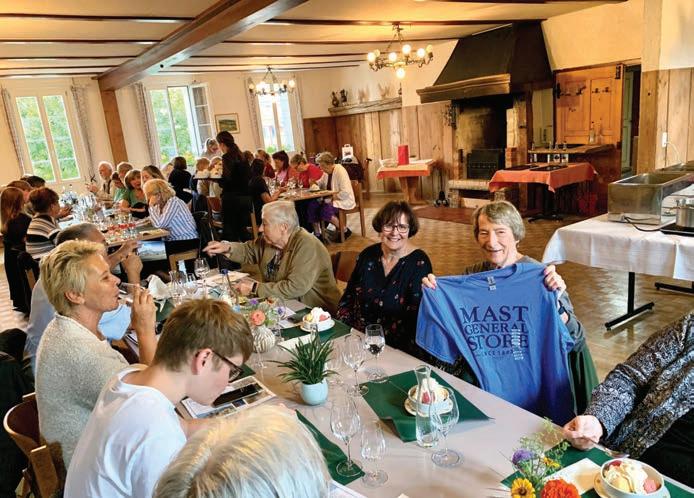
grazing in the summer. One evening we had a local group come to sing and yodel for us. Another evening a man came to play the Alphorn (like in Ricola ads).
Two days that will always live in our memories are the two that we spent in the Alps, in Murren and on up to Schilthorn.
Our first view of snow-capped mountains in the distance was such a thrill. There were many oohs and aahs and attempts to take pictures through the windows of the bus. We had no idea what we would be seeing later! We drove through little towns as we got closer to the mountains. Waterfalls coming down the rock faces of the mountains called our attention. Then we saw the cables up ahead and knew our adventure would soon begin. Our timing was great, and we were soon on the first of two cable cars taking us high up the mountain. The snow on the rocky mountain tops and sides sparkled in the sun. The views were breathtaking. The only appropriate response was when some in our group sang “Our God is an Awesome God” and “How Great Thou Art”. The spectacular scenery was nearly overwhelming. As the afternoon gave way to evening the scene continued to change. The sun hit the mountains in various places and then the light would move. Fog covered part of the mountain, but it also would move. The final dramatic scene had several areas

at the back in a bright pink/orange color that made it look like it was on fire. We continued to hold those songs that were sung in our hearts as we gave thanks for the incredible blessing of being here and seeing the majesty of God before our eyes.
How many pictures can one take of rolling hills dotted with cattle? Or of tall forest covered mountains with clouds circling the tops like halos? Or of charming wooden houses with green shutters and window boxes filled with beautiful red flowers? In some ways the scenes seemed the same, but in other ways they all had their own special charm. All these scenes transported us to another day and age and connected us with what our ancestors experienced. They also reminded us of the beauty of creation –both natural and man-made, all around us. The strength and permanence of the mountains was so dramatic. The glacial blue of a lake added a softness to the scene. The snow on the mountain tops reminded us of the seasons of the year ordained by God. The clouds were adornments but were ever moving, showing us that life does not sit still – it is always changing. A bird flew low across the lake, adding a touch of life to the scene. How many pictures can we take? As many as time allows as each shows a moment in time and together we have more reason to give thanks.
Our last day in Switzerland was amazing. We were all filled with the beauty of the mountains, the friendliness of the people and the faith that binds us all together. We looked forward to reuniting with our families again at home but also were sad to think of leaving this incredibly beautiful country. Our mixed emotions were minimal when we thought of what our ancestors went through the day before they left. Their religious beliefs were so strong that they willingly embarked on the long voyage and the uncertainty of where they would live. After seeing the places where they came from, we can understand why they first chose the rolling hills of Pennsylvania.
Our last day took us through some of the most spectacular scenery we had seen on the



trip. Snowcapped mountains, tall dark green pine trees seeming to stand at attention below, waterfalls cascading down the mountainsides, ridge after ridge of mountains. It was a thrill to climb up beyond the tree line, passing through tunnels and innumerable hairpin turns. We truly felt we were on top of the world and then we descended to the world we knew on the other side.
We left the next day on an incredibly easy trip home. But we will think of the trip our ancestors took so many years ago and give thanks for the opportunity we had to travel through this beautiful country and feel a true connection we never felt before.t
 STORY BY HARLEY NEFE
STORY BY HARLEY NEFE
With the season of giving here, many people can be found out and about in the community looking for the perfect gifts for their loved ones. While perusing the various businesses that are available in downtown areas across the High Country, there are lots of unique spots to visit. However, the holidays mean so much more than materialistic items, and there’s a new locally-owned store in West Jefferson that was inspired by something greater – family and passion.
“The Wranglin’ Mae Mercantile is a roundup of everything I’m passionate about,” business owner Chloe Parker explained. “The reason why I wanted to brand my personal business as The Wranglin’ Mae and not add ‘Store’ or ‘Boutique’ at the end of it is because it’s a collective. I never really knew what I wanted to specialize in. I knew fashion would definitely be one of them, but I’ve always had a million jobs, so I knew this could end up being a lot more than clothes. I needed to brand it pretty collectively so that whatever I wanted to do could fit underneath that name.”


The name Mae is a sentimental family name that means a lot to Chloe.
“Mae is a name I hold dear to my heart because it is a generational name that has been passed down,” she shared. “My great great grandma – her name is Martha Mae. My great grandma is Anna Mae, and my grandma is Kathy Mae, so I come from a long line of Maes. I’m not a Mae, but I wish I was, so that’s why I named my business this. I am bringing this family name back proudly with this business venture.”
The Wranglin’ Mae is located at 114 N Jefferson Ave, and it held its grand opening on August 20, 2022, with a soft opening scheduled the day before. On September 16, 2022, the business celebrated its ribboncutting ceremony with the Ashe County Chamber of Commerce. The storefront is home to over 25 hand-picked vendors, and it’s a place “where modern, boho, & western collide” by offering apparel, body care, home decor, accessories, and so much more.
“No one knew I was doing this business venture until I messaged them, telling them I wanted them to be a vendor in my store,” Chloe explained. “They needed to keep it top secret until I launched. That’s how I went about it. I’ve wanted to do this forever.”
Chloe was born in Boone and has lived in Ashe County her entire life. On top of that, she is a first-generation business owner, as no one in her family has owned a business before. However, being an entrepreneur is not new to her.
“I’ve had a business in some form since I was 12 years old,” she shared. “Whenever I was 12, my grandpa would take me to all kinds of auctions and flea markets. I would be like, ‘I don’t like this, but I’ll buy it because I’m sure somebody does.’ So, I would buy it when I was 12, and I would take it and ask my friends, ‘Hey, do you like this?’ and they would say, ‘Yeah,’ and then I would tell them to bring me $3 tomorrow because I was
12. $3 was a lot then. So, it started like that.”
By the time she was 15, her business venture grew into a brand called Chloe’s One-Stop Shop, where she would resell jewelry and light fashion items while being in school. As an Ashe County native, Chloe attended Ashe County High School.

“Whenever I was in high school, I always hated seeing people wear the same things as me,” she said. “I hated it, hated it, hated it. It was the worst. I would probably leave school if I saw that happen honestly.”
Specializing in women’s fashion, Chloe describes her style as “preppy western.”
“That’s how I dress – very unique,” she said. “I have always thought about clothes that I wear personally. If I wear it, I knew other people would want to wear it because everyone always tries to buy the clothes off my back. If I’m wearing it, they’ll wear it.”
Fashion became a huge interest for Chloe, but that wasn’t her only liking.
“While in high school,
DANAI had three jobs,” she explained. “I was working as a resident assistant in a nursing home; I worked at the movie theater for a little bit; and I started pet sitting.”
Chloe graduated high school with her Associate of Arts degree because she participated in the Career and College Promise Program. This opportunity is North Carolina’s dual enrollment program for high school students, which allows students to enroll in college-level courses while completing high school.
“Chloe took classes at Wilkes Community College, and I taught her statistics and pre-calculus; she was in my classes there,” Dana Henson said. “I had a connection with her because I also taught her mother when she was at Beaver Creek. I did my student teaching there, and I think her mom may have been in
my class when I was student teaching. So, we made that connection right off the bat, and then just her lovely personality. She’s outgoing; she’s caring; she’s smart. She’s just one of those people where you want to talk to her. She’s easy to talk to.”
Dana continued, “We made that connection, and being at the college level, I feel like that connection is a little bit easier to manage because I treated all of them like adults. Chloe handled that very well even though she was in high school. She seemed to have a maturity level above most of her peers. We hit it off well, even though I was her teacher. I also felt we were close in other ways too, not just the student-teacher relationship, but we built a nice rapport. It happens a lot in a small town like this. You can do that, and it’s easier to make those connections with family as well. Then I had her sister in middle school, and the relationship continued to build through school, but now it’s through business.”
Dana, who is also local to the area, is one of the employees at The Wranglin’ Mae but has known Chloe and her family for a while.
“I started working here

Chloe is driven. She’s driven; she’s brave; she’s determined. Resilient. She perseveres in everything that she does. She’s just a beautiful all-around person. Outgoing – she’s got the personality for it, but she also got the brains for it. There’s just a lot of good things I could say about Chloe.
-
HENSON
in August, right after Chloe opened,” she said. “She posted on Facebook that she was opening her store, and I was super proud of her for taking on this adventure. She posted on Facebook that she needed some help, and I liked the post. And then I ran into her a couple of times at various events. There was no rhyme or reason for us coming into contact with each other, but we did. And then she reached out to me on Messenger and said, ‘I noticed you liked my Facebook post. Would you be interested?’ And I was like, ‘Why not!’ I recently retired from teaching, and she was a former student of mine, and I love her to death. I love working here. I like working for people who have it together.”
“Chloe is driven,” Dana described. “She’s driven; she’s brave; she’s determined. Resilient. She perseveres in everything that she does. She’s just a beautiful all-around person. Outgoing – she’s got the personality for it, but she also got the brains for it. There’s just a lot of good things I could say about Chloe.”
After high school, Chloe was accepted into her dream college –UNC Chapel Hill, and not just that, but she received a full ride for business management.
“My business venture grew really, really crazy, and by the time I was 18 and going off to college, it transformed into more sustainability shopping,” Chloe described. “I would thrift and upcycle clothing. And then I would do one-on-one styling sessions and personal shopping for people. They would send me some outfit ideas that they were looking for, and I would go find
everything that they wanted.”
Chloe continued, “That was paying the remainder of my expenses. My rent, my bills, my gas – anything that I had to pay for – that was paying for it. I was working full time in college.”
She graduated from UNC Chapel Hill in two years instead of four and then came back to her hometown. Chloe has experience giving horseriding lessons, waitressing, and substituting and tutoring for the local schools as well.
She also has plans to further her education and obtain her master’s degree in business.
“I want to be a very well-rounded member of society,” she said. “I want to be very productive, very helpful, very educated, and very smart. I want to be able to blend into any conversation I’m thrown into.”
This mindset then led Chloe into having her own booths in different locations across the region to continue her fashion business.
“I had them all over including in Blowing Rock and even in Tennessee,” Chloe said. “I was everywhere, and it was so spread out. I’ve had a booth for five years now, and that’s why I was able to get this store started. I started as a booth, and that’s why it was important




for me to keep booths in here.”
One of the vendors in The Wranglin’ Mae is Hope Designs, which is run by a 9-year-old and an 11-year-old.
“They make jewelry from start to finish, so obviously when I figured out that they were interested in this, I wanted to bring them in because I started when I was 12,” Chloe explained. “It only made sense to give them a chance. To be so young – I would have never thought of that when I was 11 years old.”
With the many vendors in the store, there is a wide variety of products customers can find.


“We have anything from clothes to a jar of honey,” Dana Henson described. “There’s a vendor who makes items out of leather. There are t-shirts, pocketbooks, jewelry, and children’s clothing. There are home interior items, decorations, and a section of stuff for animal lovers. There’s also a woodworking section. Chloe found people who make jewelry and others who take area photographs around Ashe County that they sell. Anybody who comes in, they will find something that they like. There’s something for everyone. It’s just a really nice store.”
The front half of the store, around 65% of the space, contains Chloe’s merchandise, including graphic tees and sweatshirts that she helps manufacture herself.

“I work with one of my friends in Hickory, and we design them together,” Chloe explained. “She prints them in Hickory, and I will go and pick them up from her. That’s how I’m able to make sure that my designs are not the same as others from my vendors in the store. We work together to make sure we don’t have the same merchandise.”
Chloe continued, “In my contract, it says exclusivity is not guaranteed. I had a vendor get upset because someone else brought in a similar item, but I talked them up and encouraged them. I said that they were manufacturing theirs and the other was not – they were wholesaling. I told them, ‘You have a lot more heart, soul, and passion in yours. You advertise that, and people will see it.’”
Chloe spends time manufacturing pieces herself as
I really wanted Main Street because I always shopped on Main Street before I opened this. People come here for Main Street, and I wanted to be here. The thing about Ashe County is that everyone is very welcoming.
- CHLOE PARKER
well as buying wholesale and reselling. There are a variety of distributors that she gets her items from.
“I may only order from some companies once, but then there are a few that I order from regularly, like Blu Pepper,” Chloe shared. “I loved them before I even had a store, so I knew
when I had a store that I would want to carry them.”
Lately, Chloe said that the best-selling items in her store have been accessories.

“Definitely hair clips,” she shared. “They are huge right now thanks to TikTok. You can never go wrong with earrings as well. I’m always sure to stock up on jewelry and other smaller fashion accessories. They are always best sellers. People are also really big into purses right now. I’ve sold a ton of purses since opening. I’m constantly restocking those. I imagine toboggans will continue being a big hit too, because they always were when I was a vendor in other areas.”
As far as the other vendors in the store, there is a fee they pay in order to rent a space as well as some commission.
“The commission goes towards helping pay staff, the power bill, water bill, and snacks that I provide,” Chloe said. “And the rental fee helps cover the rent for the building. The rental fee is based on size.”
The smallest spot can be just a shelf, and then sizes of spaces in the store grow from there. One vendor has the entire back wall of the business.
“Current vendors are always welcome to expand if I have the room,” Chloe said. “If I don’t, they are kind of maxed out for the time being, but I always try to accommodate where I can. All the spots are on six-month contracts, and at six months, anyone can pull out, which is fine because people want to be in here. A lot of vendors are trying to expand.”

As far as location goes, Chloe had been looking for a space for a while but knew that she wanted to be on the main street in West Jefferson.
“I really wanted Main Street because I always shopped on Main Street before I opened this,” she said. “People come here for Main Street, and I wanted to be here. The thing about Ashe County is that everyone is very welcoming.”

Dana added, “The environment of downtown Ashe County is always very nice and easy going. The store just kind of fits that whole environment. It’s been a good experience. The people who I have come in contact with from various places – like Indiana, Washington – People are from all over visiting Ashe County for different reasons. There’s a lot of locals, but there are also a lot of tourists that come up the mountain.”
For only being open a few months, The Wranglin’ Mae has received many compliments already.
One review on Facebook says, “I love this boutique! It is so organized, clean,
and all of the items are so cute and affordable. I will definitely be shopping at The Wranglin’ Mae more often.”
Another reads, “There’s so much variety that you need a couple of hours or a couple of trips to see it all. I love the labels carried, and that there’s something for everyone, including the puppy family members.”
Dana shared, “I’ll get compliments about the store and its layout. It’s so fluid, and it blends well together. The decorations are nice, and there’s cleanliness. They always give me feedback that is positive. I haven’t had any negative feedback.”
As a business owner, Chloe welcomes all feedback from staff and guests.

“She takes criticism well,” Dana said. “She sends out little surveys to all the employees for us to fill out, asking us how we feel about the store, what can be improved, and what we should make sure we have. She will ask what kind of things we would like to see in the store that are not there. She’s gathering a lot of information behind the scenes and adapting her store to the environment.”
The layout of the store changed drastically once the space became Chloe’s. Before The Wranglin’ Mae, it was a juice and smoothie bar.
“It had a big, huge countertop, and there was a full kitchen,” Chloe described.
However, she accepted the challenge to create her vision.
“I had a month from the time I signed the lease to the time I moved in and opened,” Chloe said. “That’s how long I had to get everything renovated and set up and my vendors picked out. It was very fast paced, but I’m used to fast pace, so that didn’t bother me at all.” There are a lot of tasks that go on behind the scenes to run the business.
“Chloe keeps up with all the items in the store and pays the employees and vendors,” Dana said. “In the backroom, I’ll come in each week that I work, and there’s always something new back there, There’s more boxes to be unloaded. There’s clothes to be tagged, priced, and inventory to be kept. Chloe has a lot more to do behind the scenes because of all the inventory that’s coming in and how often it’s switching out.”
“Our inventory changes so fast,” Chloe described. “Packages are arriving all the time. I usually get a package each
day, so there’s always something new to be put out. I order in bulk so that I have enough to keep pulling from, and I’m not waiting on new stuff to get here. When I say there is new stuff hitting the floor every day, it’s literally every day. New hair clips, bracelets, anything. There’s always something new coming out. I always preach, ‘Work your space, and it will work for you.’ People don’t understand what I mean when I say that, but the more you’re in here and the more you’re rotating your stuff, the more money you’re going to make because people see your work. They see you’re putting in the time to do that.”
In addition to owning the business, Chloe has also been working full time.
“I started managing the Habitat for Humanity Restore,” she said. “The store is full of donations people bring to us, or we go and pick them up. The finances from that help build housing for people. I started out working at the Ashe location and then moved to the Boone location. It’s a great organization. I’ve always loved helping people. I learned so much by managing people and volunteers at Habitat. It really helped me build how I wanted to run my store. I love what I do.”
“After she does that job, she comes here,” Dana explained. “She comes here every morning before opening because I can tell she’s been in. Something will be a little different to show that she’s been here already before she goes to her fulltime job.”
People don’t realize just how much work goes into running a business.
“She’s got energy for sure, and the clothes when they come out of the box –they don’t look as good as they do when they are hanging up,” Dana said. “You have to steam them, and you have to get them on the hangers and price them at a price that you think will sell. Chloe has to travel to the market to pick out items she thinks will sell in the store and that people will buy in our area. But people love to shop, and they love to shop locally. They love the fact that there are vendors throughout the store that they are supporting. It’s not just Chloe.”
And Chloe couldn’t do what she does without the many people who are also involved, including vendors, employees, models, photographers – the list goes on.
One of the employees of The Wranglin’ Mae is Chloe’s sister, Maggie Parker, who is in charge of content

creation across social media platforms.
When brainstorming ideas on what to post, Maggie said, “I like to look at businesses that have a larger social media presence for ideas. I also like to work with friends to come up with ideas we think people our age would be interested in.”
With Chloe and Maggie being sisters and working together, it hasn’t always been easy, but it actually became a positive experience for the both of them.
“Working for my sister is not something I thought I would like as much as I do,” Maggie shared. “But working for Chloe has brought us closer together. I really enjoy it. I like being able to have interactions with customers and not having the feeling of constantly being rushed to have things done.”
Another staff member is Josie McCoy, who has known Chloe for six years and is also a local to Ashe County.
“We used to go to church together,” Chloe said. “She’s a really sweet girl, and she has been a perfect fit. She is so hard working, and she constantly is branding and putting out my clothes for me. She does such a great job. She really helps me with the inventory of it. She knows what I’m looking for. She constantly cleans the store. She’s great.”
Josie said she also saw the Facebook post online about The Wranglin’ Mae hiring and was interested right away in the position, as she’s big into fashion and already knew Chloe.
“Chloe has always been so nice that I knew I would enjoy working for her,” Josie said. “And it’s been great. I love working here. I especially like seeing all of the new inventory Chloe gets in each week. Chloe works hard to make sure there is something at the store for everyone. Everyone that comes into the store that knows Chloe speaks highly of her. They always say she is such a sweet and caring person.”
“Everyone has a key role,” Chloe said of her staff. “My employees are all such a huge asset. And since I’m not here during the week, I have to have good staff to be able to feel comfortable about leaving my store.”
The hours of operation for The Wranglin’ Mae is from 11 a.m. to 6 p.m. Tuesday through Saturday and 1 p.m. to 5 p.m. on Sundays during peak season. The store will remain open four days a week during the off season with adjusted hours. The storefront is currently closed on Mondays but has an online presence through its website at www.thewranglinmae.com, Facebook, Instagram and TikTok. Customers can check online for the most up-to-date information. Chloe also admins a VIP group on Facebook where she promotes sales for her items.

“I do offer shopping online through Facebook and Instagram,” Chloe shared. “Right now, the website is not a buying platform yet. Eventually, I would love to do that, but our inventory changes so fast. I just can’t imagine what it would be like to keep the content updated. It changes all the time. However, people

can FaceTime me if they are not local, and I’ll walk them through the store and ship items to them. I also offer one-onone styling appointments. People come in here, and I’ll help them pick out a brand-new wardrobe.”
However, probably the most inspiring part of the story is that Chloe is in her early 20s.
“She’s only 21,” Dana said. “When people come in, they think it’s my store because I’m the age people think someone should be having a store and being brave enough to go out and do it. Well, when I tell them, they pause for a moment and have to think about what I just said. I just help her out a couple days a week with the store. They’re trying to process all of that information, which is surprising to all. That’s why I say she is so brave to go out and take on this adventure at such an early age – that takes a lot of courage. And it’s successful. It’s working out just fine. I think it’s doing great. She’s doing the right things to be successful. As long as she continues, she will continue to be successful and probably even grow.”
As for the future of The Wranglin’ Mae, Chloe said she would like to continue expanding her business locally with more storefronts.

“Maybe Asheville, Knoxville, Chapel Hill – I would love to be on Franklin Street. Maybe Gatlinburg or Blowing Rock,” Chloe shared. “I would be tickled pink to open a new location, but we’ll just take it where it goes.”


“I am super proud of Chloe for taking on this adventure,” Dana further described. “Chloe always looks so nice in her outfits. She loves style, and she
loves fashion. So, she is going after that. She wants to make that her profession, and she’s doing what she loves.”
Maggie added, “I’m extremely proud of how far Chloe has come with her business. This has been her dream since she was in middle school, and it makes me and our family so happy to see her pursuing that at such a young age.”
“When I dream of The Wranglin’ Mae, this is it,” Chloe said with a big smile on her face. “I’m doing my own thing, and it’s working. That’s what matters to me. It’s a lifelong dream come true, and I have no doubt that this is only the beginning. Thank you to everyone who has made this possible and supported this venture in some way!” t
WHEN I DREAM OF THE WRANGLIN’ MAE, THIS IS IT. I’M DOING MY OWN THING, AND IT’S WORKING. THAT’S WHAT MATTERS TO ME. IT’S A LIFELONG DREAM COME TRUE, AND I HAVE NO DOUBT THAT THIS IS ONLY THE BEGINNING. THANK YOU TO EVERYONE WHO HAS MADE THIS POSSIBLE AND SUPPORTED THIS VENTURE IN SOME WAY!
- CHLOE PARKERModels showcase the unique style of fashion that can be found at The Wranglin’ Mae.





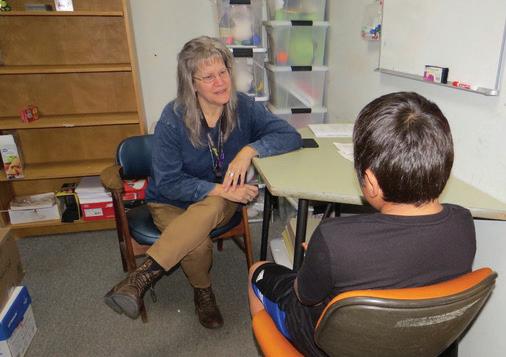 STORY BY SHERRIE NORRIS
STORY BY SHERRIE NORRIS
When Denise Presnell announced that she was leaving Watauga County, a collective gasp could be heard throughout the area, especially within the school system in which she has worked for nearly three decades. But, it’s very possible that each and every social and public service agency in the area felt the same whoosh of air escaping its portals. At first, it was as if a cable to the community battery was losing its connection, but after talking at length with this social worker extraordinaire — whose impact has been felt near and far — we quickly realized that her own personal battery is being recharged and she is ready to move forward on an uncharted path.
At a time when many others in the education and community sector might be contemplating retirement, Presnell has embarked upon a new journey after accepting a teaching position at the University of North CarolinaPembroke, with her recently-completed doctorate in hand.
On Friday, Oct. 28 — after 45 years in Boone and 29 years in the school system — with tears streaming down her face, she said goodbye to Watauga County Schools.

It’s been a challenging year and one of big change in her life, Presnell said. “I’m looking forward to what’s ahead, but
thrilled and terrified, at the same time.”
Pursuing a doctorate degree is not done without aspirations, she said, so she knew that change was inevitable. “If you have a Ph.D., you need to do something with it.”
With revisions in state employee benefits, Presnell had already reached the pinnacle of her pay scale. “So if I stayed here, I’d never make another dollar. Two years ago, I started thinking about improving my income and that’s when I started working on my Ph.D.”
Earlier this year, a colleague pointed out that with her working basically five jobs — as social worker at Hardin Park, adjunct professor at Appalachian State University, leading Watauga County Compassionate Initiative, pursuing her PhD (Walden University) and consulting — she should be able to make more money, while not working as hard. “She told me I should be teaching at a university – that’s what I needed to focus on, so this past summer, I applied at several universities. Pembroke interviewed me and invited me to visit. I felt welcomed there, the atmosphere was amazing. When they offered me the job, I accepted it. I didn’t have to think long and hard about it,” Presnell said.
“My children, Elijah and Grace — are my whole heart. Both are independent and doing well. Elijah graduated in 2021 from NCSU with a degree in engineering. He works
in the Atlanta//Marietta area as a supply chain software consultant to government clients. Grace graduated from high school a semester early, (December 2021), turned 18 in January, got a full-time job and lives on her own. They are both bright, capable, caring people and I am blessed to be their mom.”
Presnell is convinced that “you go where you are supposed to be,” and thought she would be rolled from her office chair to the grave. “But, there’s a plan that’s bigger than me, and I wanted to be open to that. I believe it’s the right time to see what else is out there for me.”
It hasn’t been easy, she said, but the support and encouragement she has received has been overwhelming.

“It’s really touched my heart, and as exciting as it is, it’s not without sadness. But, I feel that I’m doing the next best thing. Leaving the people is the hardest – I wish I could be in both places at the same time – or take the people with me. Some of them are my second family, I’ve worked with them forever. It’s been an honor and privilege to work in this school system. I have so much respect and admiration for our educators and leaders. Moving from my familiar and comfortable environment can be a little intimidating.”
“I am very sad to see Denise go, but at the same time I am incredibly proud of her and know she will do great things at Pembroke,” said Dr. Scott Elliott, Superintendent of Watauga County Schools. “Her contribution to the development of our school social work program cannot be overstated. It seems as though she initiated or helped implement every major program or initiative between the school and community. Two areas that stand out to me are our compassionate schools initiative that led to the formation of the Watauga Compassionate Communities Initiative and her
work in establishing the School Faith Collaborative that brings various churches in the community together with the common goal of supporting our schools. The entire community is going to miss her very much.”
When asked if she has any idea just what an influence she has been here, Presnell responds with visible emotion.
“I think I get it, because people tell me. But honestly, the times it meant the most to me have been when the parents I have worked with let me carry their cares, and told me they trusted me to advocate for them and their kids. When they accepted me into their families, that was such an honor and privilege. And in the schools, to hear that they appreciate what I do – and they couldn’t do this or that without me — that really means a lot.”
Having worked with eight superintendents, dozens of principals, hundreds of teachers and thousands of students and parents, Presnell said, she is the social worker she is because of what they have each brought to her life.

“It’s the first job I had out of college,” she said. “They’ve all helped mold me into what I am. The teachers, administrators and superintendents, especially, all had high expectations for me and I wanted to meet those.”
What matters most to her?
“It’s important to me that if you say you are going to do something, you need to do it. I have lived by that, and it has helped me forge important relationships. That’s my reputation. People can rely on me and know that I am trustworthy.
It always matters to me what people feel about me, but what matters more is how they trust me.”
Presnell came to Boone in 1977 while her mother attended graduate school at ASU. “We lived here for three years — and I attended Hardin Park! Then we moved to Abingdon, Va., where I went to high school. I returned to Boone for college.”
Presnell didn’t do well in school,
There’s a plan that’s bigger than me, and I wanted to be open to that. I believe it’s the right time to see what else is out there for me.
- DENISE PRESNELL
she said, especially high school or her first try at college.
“I dropped out for a couple years and ran a restaurant in town. When I was thinking about returning to college, my mother suggested interviewing a bunch of people and seeing which job I thought I would like best.”
A social worker was among those she interviewed.
“I liked the idea of being able to work in a variety of settings because I got bored easily. It’s ironic that I stayed in the same school system for 29 years. I also liked what social work stood for — justice, advocacy, and empowerment.” She did well on her return to ASU, but couldn’t find a job when she finished. “So, I cleaned houses for about six months, then got the job as social worker for Watauga County schools, part-time the first two years.”
For 10 years, Presnell was the only school social worker in all eight

elementary schools and the high school.
“Every few years, another school social worker was hired and I would give up two schools. For the past six years, I’ve been based solely at Hardin Park.”
From October 1993 - October 2022, Presnell covered a wide range of services both within the schools and community —with students, and families to county level administrators and community agencies — providing direct services, assessing needs, making referrals and providing staff interventions.
She kept track of homeless students, for which she provided needed services and referrals. She fulfilled duties per the NC Compulsory Attendance law to improve student attendance, bringing unresolved cases to court when all interventions were unsuccessful and testifying in court when necessary.

Presnell developed and maintained a large network of formal and informal resources to meet daily needs of students and their families; she helped develop and implement policies, procedures and forms that shape and improve the effectiveness of the social worker program in the school system.
“I have always tried to make myself available to provide crisis intervention for families who have immediate and critical needs,” Presnell said. She also developed and facilitated training to school staff and community agencies/ organizations to impart a better understanding of issues that affect local students and families.
She established and oversaw such monumental projects as The Hardin Park Food Pantry and Books for Students; she coordinated the Holiday Adoption Program and supervised
school interns and volunteers. Along with Western Youth Network, she also oversaw and facilitated the Lunch Buddy Program. She also co-led the Community Mental Health Project and developed and chaired the Faith Community/School Collaborative. She supervised college social work interns, participated in hiring of and provided training for five school social workers, and served as mentor for newly hired school social workers. She brought in thousands of dollars in grants for various programs and was instrumental in countless committees and special events.
Perhaps her biggest accomplishment, and one that has impacted not only the local community, but others across the state following her lead, is in helping establish a trauma-free and resilient community.
It was in 2017 that Presnell was led to educate and inform the High
“We are so grateful for Denise’s authentic leadership, and for her contagious, action-oriented (!) passion for trauma and resilience education that brought WCCI into being. She is someone who gets things done. The lives she’s touched are innumerable – she’s left an indelible mark on the community. We will miss her tremendously!”
- WCCI LEADERSHIP TEAMDenise and her son, Elijah Presnell, at his graduation from NC State University Denise and her daughter, Grace, while on a trip to Asheville.
Country about trauma and resiliency, terms many of us just weren’t too familiar with, even though many of us had lived one and desired the other. She was perfect for the “job” with her years of experience working with traumatized, abused and neglected children.
By then, she had earned her bachelors’ degree (1993) and was working on her master’s in social work from Appalachian State University (2017). It was her internship that opened yet another door for her. (See more below).
Presnell served as lead of the “State of the Child Forum 2017,” co-lead of the “State of the Child, State of the Community Event” 2018 and the WCCI Conferences 2019, 2021 and 2022.

Hand-in-hand with the WCCI, she co-led the Compassionate Schools Project, a local effort to turn our schools into a trauma-informed system.
She has completed numerous continuing education classes, presented at various workshops, and had several articles published and contributed to a number of commentaries.
In spring of 2017, Presnell was a speaker at her (master’s) graduation ASU. In May 2017, she received the Servant’s Heart Award, Watauga County Schools, and was featured in All About Women magazine’s Remarkable Women of the High Country.
Earlier, she was declared an expert witness in school social work, (Nov. 2016), received the Janice Rienerth Superhero Award, Western Youth Network, (April 2015), participated on the Expert Panel Discussion, National Child Traumatic Stress Network, (April 2018) and received the Wade Brown Award for Community Development, from Boone Area Chamber of Commerce, (Aug. 2018).
Having worn many hats in her career, it is Presnell’s dual role as longtime social worker at Hardin Park and leader of the WCCI that she will miss most of all. And likely, she will be most remembered for same.

Having touched more lives and worked with more organizations than words could describe, listing Presnell’s accomplishments would be virtually impossible.
“There are no words to describe how I feel about WCCI and each of the members, individually,” she said. “Not only has this work been the highlight of my career, but I experienced tremendous personal change, as well. It has been an honor to be part of this work; I will carry it with me for the rest of my life. I am a stronger, better person for having worked alongside each member.”
It has been Presnell’s personal goal —and that of
the organization as a whole — that Watauga County become “a relationship-driven, thriving, and resilient community that is knowledgeable, inspired and empowered to promote well-being, prevent harm, and heal from adversity — while actively addressing systemic injustices and historical trauma in all of its forms.”
Jennifer Warren, Executive Director of Western Youth Network has known Presnell for over 20 years, and referred to her as someone that she “looked up to” to help her know how to best promote child welfare when she assumed her leadership role with WYN. And that’s where WCCI was born.
“I was honored when Denise said, in 2015, that she wanted to do her master’s internship with WYN in 2016.” Warren shared. “I normally don’t accept interns because I have a hard time determining what to delegate in order to give them a meaningful experience. I knew that Denise was a hard worker and a go-getter, so I felt confident that we could work together to figure out some meaningful projects for her.”
A conference Warren had attended in September 2015 on Adverse Childhood Experiences (ACEs) still captivated her when Presnell began her internship.

“In spite of Denise’s vast career as a school social worker, she was not yet familiar with ACEs and was eager to learn more. Since I was about to go on maternity leave, I didn’t have time to do much more than introduce the concept to Denise and ask her to think of ways we could roll this information out to everyone in Watauga County.”
It was not surprising to Warren that Presnell “got straight to work” on the project and partnered with the Juvenile Crime Prevention Council to host a “State of the Child” event in the spring of 2017.
“Denise married these two ideas, and the focus of the State of the Child conference was ACEs.


“Even before the conference, Denise was busy learning all she could about ACEs and resilience, and sharing the information with all the groups she worked with (teachers, administrators, leaders of the faith community, other social workers and counselors, etc).
Because of her vast connections and her solid reputation in the school system and community, she brought my dream of ACE awareness in Watauga County to life in a way that no one else could.”


But, Warren continued, Presnell didn’t stop there.
“Instead of letting the conference be her signature internship project, she elected to keep the project going and formed the Watauga Compassionate Communities Initiative, which was aligned with the CDC’s Essentials for Childhood Framework that outlines how to tackle ACEs —raising awareness of ACEs, using data to inform solutions, evidence-based programming, and policy change.”
WCCI has been meeting monthly since 2017 and has hosted conferences,




lunch-and-learn conversations and served as the catalyst for a lot of current community projects, including the Watauga Housing Forum and Watauga Housing Council.
“It’s so rewarding to hear organizations say that they’ve changed the entire way they do business because

“Denise has not only been a coworker, but most of all, she has been a friend and a mentor to me, personally and professionally. Denise has ALWAYS been present for anything I have needed help and guidance with. Her heart and passion for the community and the families are palpable as you walk the halls at the school and the sidewalks of Watauga. Her vision and passion have changed lives, including mine, and have taught me that no matter what, there is always a way to continue walking. Denise has been instrumental in guiding me to reach out to my Latino/Hispanic community and talk about the Stigma of Trauma. She took me out of my box and pushed me to share this with our community. Because of her, our community is stronger, and the stigma of trauma has changed into the Resilience and Light that our community now shines.”
of WCCI,” Warren concluded. “It’s amazing that kindergartners are now learning about how their brains work and what to do when their ‘lid is flipped.’ It’s incredible to see business owners talking about implementing trauma-informed workplace policies. Seven years after attending an amazing conference on ACEs and having a dream that Watauga County would know about ACEs (and be determined to resolve them), I now see evidence of this dream everywhere. Denise Presnell was the catalyst for making this dream a reality.”

Presnell doesn’t worry about leaving WCCI, knowing it will be in the hands of capable leaders.

“I talked to our fantastic leadership team and I felt sure they were ready to move forward,” she shard. “Candis Walker has agreed to take over my leadership role, and I feel 100-percent confident in her abilities. We have worked so closely together, It’s like our two brains together have always made one really strong brain. And I’ve asked others to step into leadership roles.”
Presnell would like to see grant funding to pay a fulltime director. “At the very least, my hope is they can
sustain themselves where we are. And I believe they can. The leadership team consists of a lot of strong, dedicated and energetic members.”
Having worked on WCCI 20 hours a week for the last five years, Presnell said there was still more she wanted to do, but just couldn’t fit it in.
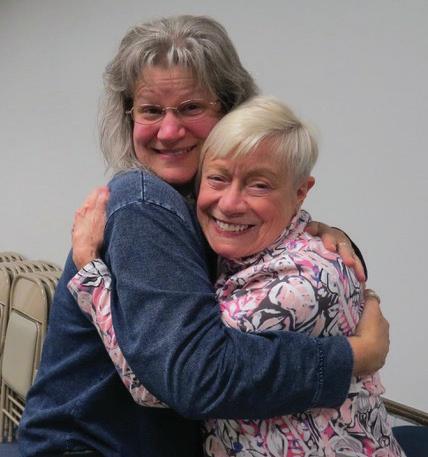
“I feel good about the people who make up that group and I feel sure they will do well with whatever comes next.”
Several other team members she mentioned —Yolanda Adams, Wysteria White, Clair Jensen, Christelle Marsh,
Elizabeth Kerley, Marissa Cornell and Mackenzie Laney, especially – as those who have been with her through every conference —“And I would walk through a dark alley with them anytime.”

And, then there were the “Wednesday Conversations” with folks like Lindsey Sullivan and Molly Furman, with whom she connected — “people who know and really understand. And, Kelly Baruch Scott –she’s one of those hard to describe. Like a sister to me – she’s just another one whose heart leads her. It’s been really important to have those people in my life, who are always trying to make a better place and try to ease the pain of others.”
Trauma, Presnell described, “takes on a form, an entity of its own — it tells you that you are alone, that you are isolated, so you stay there without realizing that there are other people out there who understand, who care. Five years ago, if you had asked me about any of this, I might have had a different outlook, but I am so blessed to have had the relationships I’ve developed. A lot of people have been instrumental in helping me become the person I’ve become.”
When we asked Presnell who has been most influential in her career, it was educators and leaders including Billie Hicklin and Patty Buckner, Brenda Reece, and Mary Smalling. Smalling was principal at Hardin Park for 20 years while Presnell’s children were students. “She had a lot of faith in me and not only encouraged me to be the best I could be, but she also praised what I already was. I didn’t have a lot of that early in my life.”
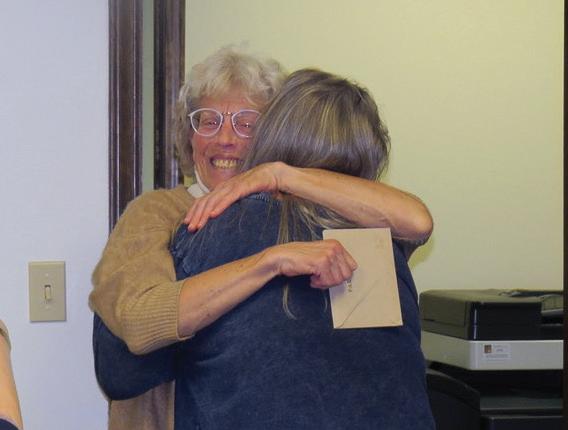
With master’s degree complete, Presnell was thinking, even then, about leaving the school system. “But that was about the time Dr. Elliott and Dr. Holden came here. They took an interest in me and helped turn things around. To have a superintendent who makes time for his staff means a lot. They’ve been very influential and my Ph.D. dissertation topic was successful partially because of them —“Understanding Rural, Western North Carolina Public-School Superintendents’ Perceptions of Trauma-Informed School Assumptions and Principles.”
Mr. (Philip) Norman, current Hardin Park principal, is another one who cares about people’s hearts.”
“Denise’s impact here at Hardin Park is difficult to measure,” Norman said. “I think we won’t know her true impact until she is gone. She has forged so many deep family relationships that span generations. There are families here that probably do not have any idea who the principal is, but definitely know her. She has contact with families that nobody else does. Families trust her and will go to her for support and assistance when they have no idea who to turn to. She does anything and everything to ensure that their needs are met. Denise has been the bridge between families and the school in ways that I have never witnessed. She is a hands-on social worker. She is one of the hardest working people I have ever worked with. If you think of a project and ask Denise for her help, consider it done and done well. Her heart is gold. The Hardin Park community will be forever grateful for her service and the vacuum that will be left when she leaves will take years to fill. Personally, I am devastated that she is leaving. I rely on her to be the compassionate arm of the school. I have had complete confidence that every Hardin Park family was cared for under her watch.”

“Denise is a force of nature and proof of what one consistent, caring adult can do in the life trajectory of a child with a high ACEs score. Denise has inspired me to new heights professionally and has been a constant source of personal support through crises and good times. We part ways as forever friends and I will miss seeing her smile but always stay in touch. UNC Pembroke is one very lucky university!”
We asked, what is there left to do? What more do you want to accomplish?

“I feel like I’m just getting started,” Presnell replied. “I want to write a book. I’ll be teaching fulltime and see what’s that like, where that might take me. And I love consulting, which I’ve been doing some of recently in McDowell and Ashe counties.



With WCCI serving as a template for other communities around the state, Presnell added, “I really love the people who are bringing me in to the trauma work, helping them get established with their own programs.”

And, the thought of working smarter, not harder, definitely has appeal for her. “It’s exciting for me to think of having time for myself – I haven’t even read a book in 10 years. I haven’t had time. I just need to figure out who I am outside the school system—that’s where I’m going to start. I’m going to try to not work five jobs. I have operated on adrenaline most of my life. I’d like to bring that down a few notches and be a calmer, slower person. I really don’t want to go into this with 100 things to do.
People have told me I need to write a story about my life, but that might take a while.”
Presnell hopes to be remembered fondly as a great social worker, a community leader who cared.
She reported to Pembroke in early November and will
begin her new teaching career in the social work department in January. She believes it’s going to be a good place for her, but Watauga County will not be far from her heart and mind.
She will be remembering a lot that has happened in her life, things that brought her to this point.
Whether it’s the advice she took seriously from her mother, a therapist in Virginia, who said, ‘You may not realize why all these things happening to you, but I want to say to you – never say ‘no’ to anything. There is no limit to what you can do – stay open.”
Or perhaps, it’s the memory of her brother that fuels her, “a late starter” who died 10 years ago at 28, and had such big plans, just six months from graduating with a degree.
“Ever since he died, I’ve had a burning compulsion to do things he wanted to do,” Presnell said. “I feel like I’m living for both of us – doing the things he didn’t get the chance to do. I never thought I’d get a master’s or speak at my commencement. I never thought I’d teach at ASU, never thought I’d get a Ph.D., But here I am – I really tried to honor my convictions – It’s not led me wrong.” t

This has been a great year for the Children’s Council of Watauga County as it has celebrated 45 years of serving children and families in the High Country.

Since 1977, the Children’s Council has worked to ensure that all children have access to early care and education — and that families have the support they need to give their young children the opportunity to succeed. It has always been the vision of the agency that the community, as a whole, be one that supports, nurtures and empowers children and families.
And how does the organization meet that goal? According to Executive Director, Elisha Childers, it is by investing resources, information and training toward promoting the future health and success of our greatest community asset: our children.”

Childers, who came to Children’s Council with an impressive education and career experience, has worked extensively with children, families and nonprofits for many years. “We believe that every child deserves the opportunity to live a healthy, happy life and our programs provide access to education and support for families and children in Watauga County.”
The number of programs and participants of the Children’s Council is remarkable, with far-
reaching impacts in lives of the young and young-at- heart who have a love and genuine concern for children.
What began as a volunteer organization, comprised of concerned community members who recognized unmet needs among young families, the Children’s Council has grown
through the years to a level few, if any, would have ever imagined in those early days.
As 2022 comes to a close, and the anniversary celebration wanes, anyone who has had any affiliation with this agency will agree that it is certainly a gift that keeps on giving — and
hopefully will continue to do so for many years to come. With that said, however, Childers and her staff are incredibly grateful for all the support they’ve received throughout the years, with special events, and especially the recent celebratory fundraisers, that helped further their cause.
“This type of support (that we have received) is critical for the health of any nonprofit organization, and allows us to use funds where they are most needed to assist the services we offer and the families we serve.”
Referring to the importance of early interventions, Childers added, “A person’s brain grows at its most rapid rate during the first years of life and brain development occurs within the context of a child’s relationships with the adults who care for them. Therefore, serving children in this age range means you are working with the adults who are caring for them. For us, this means parents and other family members, as well as early childhood educators, who provide care for children while their parents work. It also means creating a community that supports the healthy growth and development of young children by making them a priority and by ensuring a continuum of services are available to support their needs.”
With incredible leadership, staff and board of directors, last year alone (2021), the Children’s Council served 2,452 individuals —children, parents and early childhood educators. Of those, Childers said, 1,825 were children, 441 parents and 186 were early childhood educators.

And if those numbers aren’t enough, consider the fact that through its “Diaper Bank,” the council distributed nearly 70,000 diapers (preemies to pullups) to children in Watauga county. “Our diaper bank is the biggest driver of families to our agency,”

Childers added.
We learned that the Children’s Council is a “centralized hub” of services and resources for children during their first years of life, from birth to age 12.
All programs concentrate on child development to help ensure children are meeting important developmental milestones that prepare them to be ready to succeed in the world that awaits them. Whether through family support, early literacy programs, child care technical assistance and professional development —and community outreach and collaboration — “We focus on the importance of each child,” Childers said. “We are committed to our vision of a community where every child has the support to live a healthy, happy life. We work to build a strong foundation for children’s learning and development by strengthening families and our local early childhood system.
Dr. Gary Childers, (current chair, Watauga County Board of Education, was a driving force in the early days of the Children’s Council formation. Referring to it as “an all-volunteer organization in the late 70’s,” he first became
aware of the group as a member of Boone Jaycees.
“We were approached by the Children’s Council volunteers, around 1978, to help raise money for a child car seat exchange program they were starting,” he recalled. “They also asked us to buy children’s books to give away through doctor’s offices. They were also providing pamphlets to parents of newborns containing educational information on the importance of nutrition, early literacy experiences, positive discipline strategies, importance of positive verbal interaction and listings of local resources ,especially for low-income families.”
Childers continued, “As a teacher, then principal, who worked with younger children — and one who was active in the community through Jaycees, coaching, CROP Walks, having two young children of our own, etc. — I suppose some of the council’s early board members thought I could be helpful to their efforts, so I was asked to join the board around 1982.”
Among those early members of the board, Childers recalls working with Bruce Richter and Shirlee Gaines Edwards “who helped to get it off the ground.”
“Bruce worked at the behavioral assessment center, and Shirlee worked with social services,” Childers said. “Through their work with children and their families, they became keenly aware of the need for an organization to provide education, support and services to new parents in Watauga County.”
Childers was active as a board member through about 1987, serving as the vice-president of the board in 1985, and president in 1986.
“ I remember that Elaine Hodges was very active in keeping the organization going prior to, and during, the time I was involved,” he recalled. “During those years a small group of parent volunteers kept the existing programs going, searched for ways to increase funds and worked hard at recruiting new members to keep the council existing and going forward into the future.”
In addition to keeping the existing
programs afloat at the time, this group, Childers said, was proud to have received the first grant awarded to the Children’s Council, which was from High Country United Way.
“With that funding, the Children’s Council developed what I recall as being their first official logo, which was silhouette cutouts of children and adults standing in a line holding hands.”
Up through those years the organization had always been a small, dedicated group keeping the work alive, Childers said.
“I remember Bruce Richter saying that he always held the belief that a small group of dedicated people could accomplish a lot of good, which they/ we did over many years.”
However, Childers added, it became apparent that for the Children’s Council’s impact to increase, there was need for a paid director who could dedicate him, or herself, to the work full time. “I’m not sure when the first paid director began. Until the time that happened, good people continued to volunteer ‘keeping on keeping on’ the extremely important work of this worthwhile organization! I wish there was a list of names so all those good people could be recognized who did
their part to keep the programs going and the organization viable over all those years.”
Boone native Sharon Lee was among those “good people,” we learned, who also recalls those formative years of the agency.
“My involvement was in the early 80s and 90s,” Lee recalled. “Elaine Hodges and/or Ruth Petrey invited me to the meetings, and before I knew it, I was serving as president, The group was all about child advocacy.”
“I remember Elaine bringing concerns to us that the local ‘tot lot’ park had no fence, so we coordinated with the county to make it happen.”
One of the early accomplishments of the Children’s Council that Lee held close to her heart, she said, was born out of her own personal experience as a patient at the local health department maternity clinic.
“While waiting for long periods of time in the clinic waiting room, I repeatedly observed frustrated parents struggling to manage their wait times with multiple children in tow — and nothing at their disposal to occupy them.”
At that time, Lee remembers, “the waiting room was encircled with hard metal and plastic chairs which quickly

Kerstin Groover, lead teacher at DUAL Preschool, a half-day English language learning program serving children ages 3-5.
“Currently, we have five children where their home language is English, four with a home language of Spanish, and one child whose home language is Thai.” With the Council for about a year, Groover has “ fallen in love” with the staff, children and families that she works with. “This place is one of a kind. The people here genuinely care about our community and supporting children and families and will go above and beyond to meet the needs of our community. I love hearing children run up the stairs with their families each day — so excited and ready for school. They cherish this place so much and I can see it in their everyday routine of walking in with their families!”
lost their appeal to the active toddlers.”
With her background in early childhood education, Lee knew the children were misbehaving out of boredom — and that most of the difficulties could be remedied — if they had stimulating activities to pacify them instead of chairs.

“Thus, Project Parent Pals was born,” she said. “The Children’s Council submitted a grant proposal to the National Association for the Education of Young Children and was awarded $5000 to outfit the waiting room with developmentally-appropriate materials to be shared with the children during their wait time. We also provided an adult volunteer supervisor to interact with the families during the maternity clinic. The program was ongoing for a number of years.”
And speaking of NAEYC, Lee said she also remembers the Children’s Council participating in the organization’s annual recognition of the “Week of the Young Child” in some notable ways — such as coordinating parades through downtown Boone, hosting magic shows at the library and cooperating with local child care facilities to provide much needed respite for their workers.
“Another way in which we
advocated for children was to fund and oversee the ‘Books for Babies’ program, which provided, for every child born at Watauga Medical Center, a book with a note highlighting the benefits of reading to your young child.”
Lee was one of the original certified parent educators for Watauga County, a program managed at that time by the school system, then by Watauga Medical Center’s Maternal

Child Health, and eventually by the Children’s Council.
In the 1990’s Smart Start was established as a public/private partnership as an innovative solution the problem of children coming to school unprepared to learn. All 100 counties in North Carolina are served by a Smart Start partnership. In 1995, the Children’s Council became the Smart Start partnership for Watauga County. Smart Start funding provided funding for the Children’s Council to grow.
Marshal Ashcraft, current board member, Watauga County Schools, said the Children’s Council had been around “quite a while” before he moved to Boone in 1998.
“I was executive director from the fall of 1999 until February of 2003, but I was not the first paid person in that role,” he said. “Joan McGregor preceded me, though she was not fulltime, and neither was I, for the first part of my tenure.”
McGregor worked with the board to develop an outline for how to use
state Smart Start funds and that plan had been completed before he began work, Ashcraft said. “Smart Start is what enabled the organization to really scale up its efforts, and was the dominant funding source for the years I was there.”
Ashcraft added that United Way support “and a few smaller funding sources” made up the balance of the budget at that time.
“We had a small and very dedicated team on our direct payroll, but most of our program services were delivered through contracts with partner agencies. Child care subsidies, parent education services, child care resource and referral services, and the first organized public Pre-k classes (at Bethel and Parkway) were among the key elements of the plans developed by Joan and the board, and those plans were implemented starting in 2000. Watauga County DSS, the Watauga County Schools, Parents as Teachers, the Health Department, and Healthy Carolinians (affiliated with Watauga Medical Center) were some of our key
partners in service delivery.”
In retrospect, Ashcraft said, the thing that impressed him most was how much collaboration there was among a wide range of agencies and passionate community advocates for children.
“With a different group of people on the board, or in a different county where turf battles are the norm, our board structure (mostly dictated by state Smart Start guidelines) could have been an unwieldy mess,” he added. “But, that was not the case.”

He said he later came to appreciate that the collaborative and supportive nature of the people on their board reflected an important part of what makes Watauga County a special place.
“Both at the Children’s Council, and in my later work with the school system, it became clear that people here routinely put their egos and narrow organizational motives aside in the effort to better serve children and our community as a whole,” he concluded. “The value of that ethic of service cannot be overstated, and it is an asset I hope we never lose.”
Today, the Children’s Council is one of the area’s most respected nonprofit organizations, providing programs and services that benefit children and their families, during their first years of life. Programs are available that serve families with children through age 12, but the agency has a particular focus on early childhood, and most program focus on children birth to age 5. The Children’s Council administers the state’s early childhood funds for Watauga County, and also serves as the county’s Smart Start partnership and as the administrator of NC Pre-K funds. Elisha Childers explained, “NC Pre-K is a top-quality early childhood education program for qualifying 4-year-old children to help them be ready for school. We partner with Watauga County Schools and Appalachian State University’s Lucy Brock Child Development Lab School to offer the NC Pre-K program in all eight of the county’s elementary schools, with the ability to serve up to 105 children in those classrooms. “
Outside of these funds, the agency writes grants and raises funds to provide an impressive lineup of programs and services for parents and caregivers of young children., Childers added. “These services and programs range from parenting classes, individualized parent support, parent support groups, home visiting programs, early childhood literacy programs, a resource library, and a diaper bank.
The Children’s Council also offers a half-day early childhood education program for 3-and 4-year-old children, with focus on supporting English language learners, called Dual School, in a setting that provides an enriching early education experience for all students.”
Additionally, the agency provides professional development support, technical assistance, coaching and training to early childhood professionals aimed at ensuring high-quality early childhood programs for children in the county.
Early Childhood Specialist Roberta Yates has worked with children in a variety of settings and is passionate about the importance of quality child care for everyone. “I have worked at the Children’s Council for five years, after retiring early as a social worker,” she said. “I immediately felt welcomed, supported and encouraged to use my strengths and expertise.” She described the Council as a very family friendly, and inclusive environment. “We are normalizing parent and caregiver support. We know that every parent has times of struggle, and it should be acceptable to reach out for help. Our agency is a family-friendly place where everyone is welcome and made to feel valued.” With incredible leadership, Roberta said, the agency’s programs have expanded to start serving and supporting parents from birth. “Family Connects creates those valuable relationships and connections to give every family a strong start. I work with the early education team. Everyone is passionate about advocating and educating others about the critical importance of the first years of life. We partner with early educators to create a high quality and equitable early childhood system. While some programs have already excelled in offering this, others are working and striving towards that goal. The pandemic really spotlighted the importance of our early childhood system and the impact it has on our society. We do not have a workforce if we don’t have childcare. It is a privilege to work with the early educators in our community. It is a profession that is under-compensated and not recognized for its importance. We are woking to change that.”

The agency also engages community partners and local government to build a local early childhood system that offers a continuum of support to children and families beginning at birth, even prenatally.

To serve children and their caregivers, the Children’s Council offers:
○ Parent Education & Family Support Programs
○ Early Care & Education Programs
○ Early Childhood Literacy Programs
In addition to the programs and services for families and caregivers, the agency also leads and directs various initiatives to convene stakeholders around common agendas related to strengthening the early childhood system and community development. The local early childhood initiative, Elevate Watauga, was launched in 2018 and is focused on convening our community on behalf of young children and to build a local system where early childhood support begins at birth.
○ Adolescent Parenting Program: This program serves pregnant and first-time pregnant and parenting teens between the ages of 13 and 19. The program’s goal is to support teens staying in school and postponing a second pregnancy until adulthood. Parenting skills and life skills development are integral to the curriculum that also includes support to the teen in transitioning to adulthood and into advanced education and job training.
○ Parents as Teachers: Parents as Teachers is an evidencebased early childhood home visiting program that provides services to pregnant women and families with children beginning at birth through age 3. The program increases parents’ knowledge of early childhood development, improves parenting practices to increase children’s school readiness and success; provides early detection of developmental delays and health issues through regular screening assessments; and provides family support services to strengthen families by providing concrete help for needs and group activities to build a social support network.
○ Circle of Parents: Weekly parenting support groups with trained facilitators and parent leaders focused on parenting topics of interest to each specific group of parents. We currently offer two Circle of Parents Support Groups:
○ Pregnancy Connects: Support group for expectant parents.
○ Babes on Blankets: A support group for parents of infants and toddlers.
○ Circle of Security: Healthy attachments are essential to a child’s healthy growth and development.
This class is an eight-week parenting class where trained facilitators help caregivers connect with the children in their lives. This class is perfect for parents who have experienced ACES (Adverse Childhood Experiences) or other trauma, or who are having difficulties developing healthy relationships with their children.
○ Dolly Parton Imagination Library: This program is available to children age birth up to 5 years old who are residents of Watauga County. Each month a new, carefully selected book will be mailed to a child directly to their home. Best of all, it is FREE and a great way to build a child’s home library!
○ Family Connects: Postpartum Support & Home Visiting Program: This program provides in-home visits (currently virtual), free of charge, to parents of newborns in Watauga, Ashe, and Avery Counties. This program is offered in collaboration with Appalachian Regional HealthCare, Ashe Memorial Hospital, Harmony Center for Women, and AppHealthCare (the health department) as well as Blue Ridge Pediatrics. A trained nurse provides visits to families of newborns. “We believe that by bringing families and community support together we can give babies the best environment for growth. We nurture this growth by offering you support in your home by providing information, resources, a listening ear and a helping hand during the baby’s first months of life.”
○ The Incredible Years: Parenting classes for parents of children ages 3-12 yrs. old. This class provides tips on ways to manage children’s difficult behaviors. Learning positive discipline techniques will increase parental/caregiver confidence. As negative behaviors decrease, children will gain more self-esteem. This is a parent/caregiver support group/class that offers ways to help your children succeed!
Meets once a week for 14 weeks.
○ Postpartum Support Group: A support group for mothers during the first 18 months after giving birth. The group offers a non-judgmental, supportive environment for mothers to share their experiences and support each other through similar challenges. The group meets on Wednesdays from 11:00 am to 12:00 noon.
○ Resource Library: A lending library of age-appropriate developmental toys, theme kits, take-home packs, children’s books, parenting books, reference books, textbooks (rental only), and learning materials for parents and providers to check out. The Resource Corner Library is a family friendly space for parents with young children to come in and use our resources as well as interact with their children in a calm atmosphere. Parents may check out up to 3 items per visit for up to 2 weeks.
○ Triple P–Positive Parenting Program: A parenting program is for parents with children ages 2 to teenagers. Provides one-on-one parent consultation for families seeking help with typical child behaviors. Delivered by Children’s Council staff and contracted practitioners, parenting consultation will be offered on a sliding-fee scale for families. The program also offers a free Triple P seminar series, a 3-part parenting class (can attend 1, 2 or all 3). It consists of a 2-hour session focusing on Positive Parenting.
○ Who Needs a Change? Diaper Bank: Supplies diapers to existing social service agencies and food pantries so they can distribute them to local families in need. The Children’s Council serves as the hub and distributes diapers to families in need in the High Country. Parents can get two packs of diapers a month free per child in two separate visits and earn baby bucks for more diapers by participating in our classes and support groups.
○ Family Navigation Services: Short term case management services provided to families of young children who are referred to us for assistance in connecting with community resources to meet their needs.
○ Raising A Reader: This early childhood literacy program provides a free weekly book bag to all children enrolled in the North Carolina Pre-Kindergarten and Head Start programs in Watauga County. Funded by the High Country United Way, we are able to serve 120 low income children and their parents through weekly book rotations, parent trainings, and an end of year literacy event at the public library.
○ DUAL School - Boone’s Bilingual Preschool: The Diverse Unified Appropriate Learning School, or DUAL School, serves 3-4 year olds, half who speak Spanish and half who speak English. DUAL School offers a half-day, high quality early learning experience, where children are actively engaged in a developmentally appropriate curriculum that is based on the children’s interests and supports growth in both English and Spanish.
○ Pass Through Funding/Child Care Subsidy: Financial assistance is available on a direct per child basis for the purchase of part- or full-day care and/or rate enhancements for families eligible for Temporary Assistance for Needy Families (TANF) or the Child Care and Development Fund (CCDF). Funds are administered locally by the Watauga County Department of Social Services.
*Two of her aforementioned programs (Adolescent Parenting Program and Family Connects) also serve children and families in Ashe and Avery counties .
The Children’s Council is sustainable by state contracts (Smart Start, NC PreK, and program grants from Department of Health and Human Services and the Division of Child Development and Early Education), grant from Watauga County, United Way, and foundation grants, fundraising events, and donations from individuals and businesses in our community. t

The Chakales family shared their experience with their son, Cash, a student in the Dual School. “Cash was 18 months when the pandemic started, so for a lot of his life, he was just exposed to our five. I learned from a friend who works there that it was a play-based, fun, nurturing place to go to school and play with other children his age. And that’s what I wanted for my son.

“The way they learn here lines up so perfectly with how we wanted to parent and the values we wanted to bring, and for Cash to be aware of his boundaries and how to communicate how he’s feeling. Seeing how he’s growing into his own person and his communication style has been really awesome.”
“My hope is that DUAL School will give him social and emotional skills so that he will be ready when he goes to kindergarten to make friends and problem solve and cooperate. It’s been really nice to watch him develop friendships with kids from different backgrounds. What I’m really excited is that he is learning these skills about how to be a human in the world. And I feel like it’s really going to set him up well for where he’ll be next,
This is not a daycare. Things are happening here. There are goals being set and achieved — for every kid. What a huge impact this is to set these children up to be on a successful path. The data shows that the time we put into these kids pays off for the rest of their lives. One of the things I loved about DUAL School is how invested the team is on following early childhood education guidelines. Everything is very developmentally appropriate and play-based, which is great for this age. These people are the ones I trust to take care of my kid. They are wonderful.”
Vivica is a mother of four children who started coming to the Children’s Council as a teenager pregnant with her first child. “I didn’t have resources, didn’t know what I was getting into. I saw an ad about the Children’s Council and things they can help you with, things you didn’t know you needed coming home as a new parent. I love meeting other new moms who are going through the same things as you and getting that support. I’ve been in different programs — Circle of Parents, Triple P and the Resource library with my daughters and the Diaper Bank. The Children’s Council helps you with what you need or will find resources for you. it has helped me become a better mom and understand what my kids want and need. My hope and dream is for my children to be successful in life.”



The Fraser Firs may be few in number these days — but tours, tales and family fun are in full swing at Chuck and Eleanor Lieberman’s Swinging Bridge Farm in Deep Gap.


Once a small yet thriving choose-andcut Christmas tree farm, with sales of 200400 trees per year, the 2022 crop offers only a couple dozen trees, due to Chuck Lieberman’s decision to retire a few years ago. He stopped planting trees and sold most of his inventory.
But then, Lieberman said the sight of the empty fields — along with missing the laughter and excitement of children running through the fields, searching for the perfect tree — pained him so much that he unretired.
Lieberman grows more than Christmas trees on his 16-acre farm. He also cultivates blueberries, citrus trees, and a fledgling crop of cranberries and blackberries. Families flock to the farm in July and August to pluck their own blueberries, and tours are available for a small fee year-round, by reservation.
Born in Chicago and raised in Florida, Lieberman earned a master’s degree in fruit crops from the University of Florida. He was a nursery inspector with the Florida Department of Agriculture, then moved to Boone in 1979 with his first wife and their twoyear-old son when his wife was hired to teach at Appalachian State University.
“There wasn’t a lot of work for me to do in Boone with my degree in fruit trees,” Lieberman lamented. His wife suggested they buy a farm, and they purchased the land in Deep Gap.
Lieberman got a job as a rural mail carrier in nearby Meat Camp, which he said provided a steady paycheck, health and retirement benefits, and allowed him the time to farm and pursue other endeavors.
Lieberman is very active in the
Jewish community of the High Country. He served as president of the congregation for several years, and teaches Hebrew to the children, preparing them for their bar mitzvah or bat mitzvah — the Jewish “coming of age” ceremony for 13-year-old boys and girls, respectively.
Being a Jewish Christmas tree grower in the mountains of North Carolina is somewhat unusual, and Lieberman has embraced the irony by writing hundreds of humorous columns about his experiences in farming and in life. He has gathered the articles, originally written for The Watauga Democrat from 1990-2015, into published volumes sold on Amazon and in a few local restaurants and retail shops.


His first book, Annals of the North Carolina Jewish Christmas Tree Growers Association, Volume I: The Early Years, was published in 2015 and covered Lieberman’s real and fictitious experiences — including serving in Viet Nam, his family life, his farming adventures and fiascos, encounters with aliens and, of course, his meetings with the state’s Jewish Christmas Tree Growers Association (a running gag he has presided over for decades).
Volume II: The Glory Years (son in jail, divorce, increasing tree sales) was published in 2017, and Volume III (yet to be subtitled) is in the works for publication in 2023.
In his first volume, Lieberman wrote about the beginning of his farm:
“The day after we signed the papers I drove out to the farm in our rusted-out Honda. In the back were tools and 90 rhododendrons in four-inch pots. It was the first week of October.”
He described the property, which had been clear-cut, with piles of branches and sawdust everywhere. The soil was rich, but full of roots. He began to plant the rhododendrons, then Fraser fir trees shortly thereafter, with “no idea what I was doing . . . and too ignorant even to know that,” he said. He daydreamed about his profits, intending to grow then sell the bushes and trees a few years later.
“On that day I was seeing only dreams. I was seeing rows of Fraser fir where there were none. I was seeing fields of Canadian hemlock. I was seeing fields of rhododendron in bloom. I was seeing our house, to be built on the knoll facing 10 degrees west of south.
I truly believe that on that day God sent an angel down to me with a simple set of instructions: “Go,” He said, “Find the bald Jew on the eastern side of Watauga County. Fill his head with dreams until he is drunk with it. Make the sky more blue. Make the fall colors more brilliant. Just for the one day. The waking up will take many years and be painful. But give him the one day.”
Lieberman originally sold his Christmas trees to wholesalers.
"ON THAT DAY I WAS SEEING ONLY DREAMS. I WAS SEEING ROWS OF FRASER FIR WHERE THERE WERE NONE. I WAS SEEING FIELDS OF CANADIAN HEMLOCK. I WAS SEEING FIELDS OF RHODODENDRON IN BLOOM. I WAS SEEING OUR HOUSE, TO BE BUILT ON THE KNOLL FACING 10 DEGREES WEST OF SOUTH."
- CHUCK LIEBERMAN
He had up to 7,000 fir trees growing on his hillsides, ranging from 2-yearold seedlings to ready-to-harvest Christmas trees, about ten years old and six feet tall.
After his first marriage ended, Lieberman connected with an old friend, Eleanor, who was widowed. “I was the best man in her first wedding,” Lieberman shared.
The two married 22 years ago, and Eleanor moved to Boone. “She was a big city girl,” he described. “Her father was a history professor at Yale, and she lived in Edinburg, Paris and cities along the East Coast.”
Adjusting to the quiet mountain life took a little time, but Eleanor found her place among book clubs, music groups and The Temple. She worked at H&R Block in Boone before retiring a few years ago.
THE FARM’S NAMESAKE IS A SWINGING SUSPENSION BRIDGE LIEBERMAN BUILT TO LINK ONE BLUEBERRY FIELD TO ANOTHER, COMPLETED AND DEDICATED IN 2005. LIEBERMAN LEARNED HOW TO BUILD THE BRIDGE BY READING A CHILDREN’S BOOK FROM THE WATAUGA COUNTY LIBRARY, ABOUT HOW WASHINGTON ROEBLING BUILT THE BROOKLYN BRIDGE.

“When Eleanor came, I wasn’t planting as many trees,” Lieberman said. “So we decided to try chooseand cut. We put a sign on the highway, and people started flooding in. It was amazing.”
He found selling to the public to be much more fun. “You get to deal with people at a nice time of the year. They are usually in a good mood and are excited. They drive up from Charlotte or Greensboro and the kids run around and play. They love it,” he said.

Lieberman enjoys a different crowd in the late summer, when his U-Pick Blueberry operation is at its peak. He has over 600 blueberry bushes, and families harvest their own fruit for $10 per gallon.
“The blueberry crop is essentially eternal, because the canes come up, live seven to ten years, and then new canes come up in their place,” Lieberman said. “You never have to spray them or use herbicides — the plants actually thrive on neglect.”
He said at first, he used to hand pull all the weeds around the blueberry
bushes — but later learned the bushes produced more when the weeds were allowed to freely grow. Around the Christmas trees, however, Lieberman spends a lot of time with a weed eater.
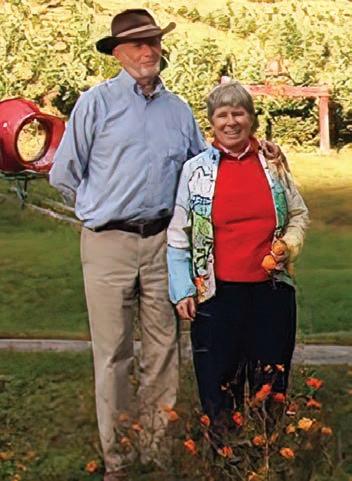



“Weed eating is my main occupation in the tree field, but I actually love doing it. I’m one of the few people in the world who love running a weed eater,” he said.

Lieberman shares tales of his tree farming and blueberry raising tips on his farm tours, along with other farm features he has developed over the years.

The farm’s namesake is a swinging suspension bridge Lieberman built to link one blueberry field to another, completed and dedicated in 2005. Lieberman learned how to build the bridge by reading a children’s book from the Watauga County library, about how Washington Roebling built the Brooklyn Bridge.
Prior to building the main bridge, Roebling constructed a small workman’s bridge for the construction workers to access the work sites. Lieberman modeled his bridge after the workman’s bridge, and even included the same sign Roebling used on its entrance:
LIMIT 2 PERSONS ABSOLULTLY NO BOUNCING OR RHYTHMIC WALKING



“Roebling didn’t want his workers to march or walk with rhythm across the bridge, because that creates a dynamic force as the bridge goes up and down,” Lieberman explained. “It increases the strain on the bridge. So I put the same sign up, for safety.”
The bridge crosses over a small creek, and Lieberman created a “creek walk” for his farm guests, with narrow wooden walkways, stepping stones, and paths beneath the rhododendron growing along the banks.
Another stop on the farm tour is an old barn, with a deck overlooking a field with the remnants of a stone fireplace.
The fireplace is all that is left of the home of the infamous Andy Johnson, a “very bad man” who was murdered on the property in 1930. He was arrested a couple of times, the last time after burning his neighbor’s barn, Lieberman said. While out on bail, Johnson was shot and killed.
“When he was buried, they put a 500-pound rock on his grave to keep him in there,” Lieberman said. While he has never encountered a ghost, Lieberman said he definitely thinks about it when walking that part of the property at night.
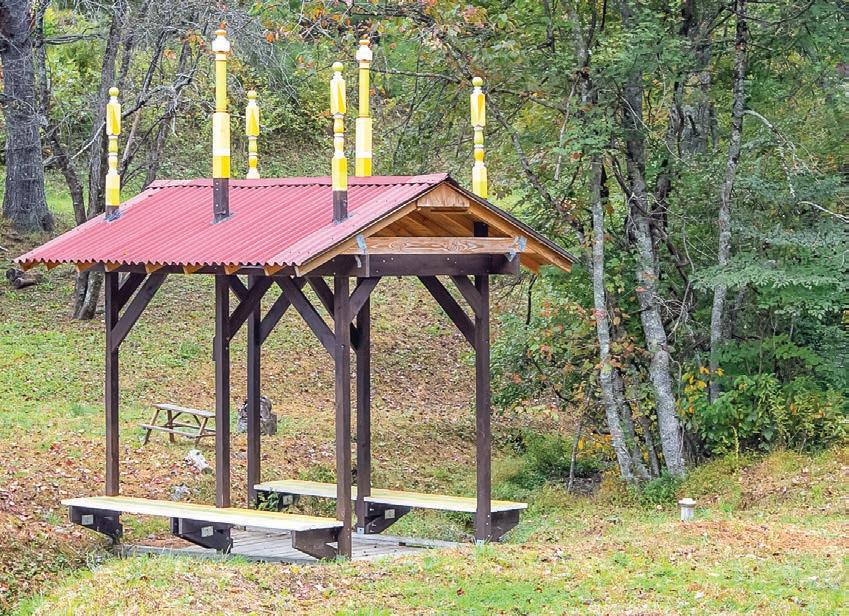
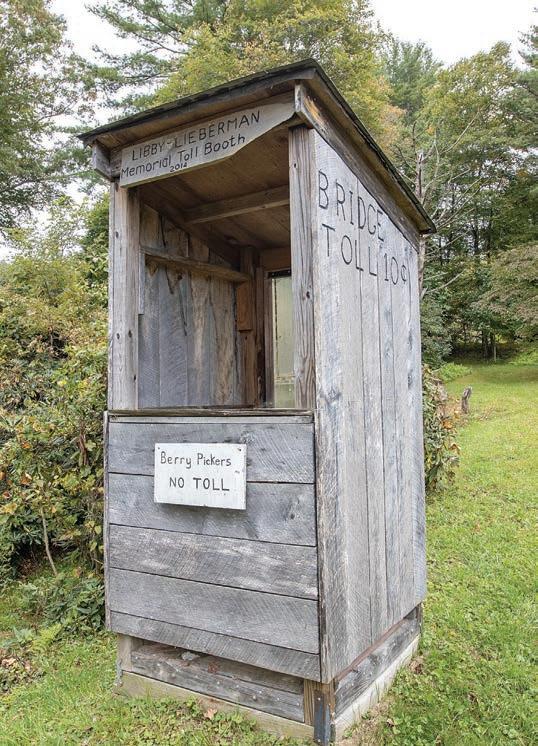
Up towards their house, Lieberman shows guests his orangery, a structure with a room for potting plants, connected to what is similar to a greenhouse.
“I’m trained in growing citrus trees, but of course you can’t do that in the traditional way in the mountains of North Carolina,” Lieberman said. “There is a very old tradition dating back to the Renaissance, where they grew lemon and orange trees in an orangery like this.”
The trees are planted in pots, so they can be easily moved. In the winter, Lieberman brings the plants inside the orangery, which is heated to 35 degrees. A greenhouse, in contrast, is generally heated to tropical temperatures of 70 degrees or so. “Citrus trees need cold air in order to flower and produce fruit. They just don’t need to freeze,” Lieberman said.
He grows — and sells — a number of varieties of citrus trees, including Ponderosa lemons, Calamondins (tiny oranges eaten whole, peel and all), Meyer lemons, Murcott tangerines, and limes.







Lieberman is experimenting with growing cranberries, which he planted in a bog on the property. “If you know the names of roads and places around here, we have Cranberry Springs, Cranberry Trail, Cranberry Creek. So I figured it would be a good idea to try and grow some,” he said.


Another recent crop is his black walnut forest. “The timber from walnut trees is very valuable,” he said.


“Of course, typical male thing - - first do something, then read the directions. I planted the trees then invited a forester out a couple of years later. He told me I shouldn’t have planted walnuts; I should have planted red oaks instead. Evidently black walnuts are prone to a disease in our area,” he said.
Lieberman realizes he’ll never see the profits from his walnut trees, anyway. “They take 80 years or so to mature,” he said. No matter. He enjoys this part of the journey, and he has another story to share.




On a cool summer evening this year, a group gathered at a charity-sponsored event held at The Mill at Rock Creek in Boone. It was similar to several fundraisers held across the High Country, with dinner, dancing, a live auction and a chance to make a difference in the lives of people in need.
W.A.M.Y. Community Action, the host of the event, partners with families and communities to provide low-
income people the support they need to become self-sufficient. Established in 1964, the agency was one of the earliest human-service nonprofit organizations to come to the High Country, and it services Watauga, Avery, Mitchell and Yancey Counties.

When the time came during the fundraising event to sponsor children for a summer camp, hands raised across the room as donors responded to the call to cover the cost. One hand
belonged to Mark Denny, whose wife, Jennifer, was once helped by W.A.M.Y.
“It was like things had come full circle,” said Jennifer. “I was a client about twenty years ago. Mark knows how near and dear W.A.M.Y. is to me, and we jumped at the chance to send a child to camp. We’re blessed to be in a position now to do that, and where I am is greatly due to W.A.M.Y.’s influence in my early life as a young mother.”
W.A.M.Y. was launched as part of
President Lyndon Johnson’s Economic Opportunity Act of 1964, part of the “War on Poverty” initiated by President John F. Kennedy prior to his death. As a Community Action Program, W.A.M.Y.’s programs were geared specifically to meet the local population’s needs.
Its funding comes from Federal and State grants, community foundations and private donations. The board includes elected public officials, representatives from the private sector and low-income representatives who can offer a first-hand understanding of how W.A.M.Y. can best meet the needs of the community. Programs and priorities change from year to year as the needs of the community change.
W.A.M.Y.’s history includes the creation of transportation authorities, senior centers, Head Start and other initiatives that branched off to operate as other organizations. More recently, W.A.M.Y. has:
• Addressed the area’s housing crisis by funding and on homes for those in need;
• Administered the Mountain Adventures Summer Day Camp in Valle Crucis;
• Provided a free community garden and food pantry in Avery County;
• Provided clients assistance with education and employment goals through its Total Family Development Program.
“W.A.M.Y. made a huge difference in my life,” Jennifer said. “The staff never made me feel like I was asking for a handout or like I was a burden. They made me feel supported as a client and emotionally as a friend — which can be rare in community outreach programs.”
W.A.M.Y.’s community connections benefitted Jennifer when she was in college, helping her secure an internship in a financial planner’s office. “This experience helped develop me into the professional I am today,” said Jennifer, who works as an accounting technician and also holds a real estate license.
At the helm of the nonprofit organization is executive director Melissa Soto, who recently celebrated 30 years with W.A.M.Y. She began her career with W.A.M.Y. as a case manager in a job training program. “I had
the desire to work with clients one-on-one and help them navigate the journey from being unemployed to finding a meaningful career,” Soto said. “I loved the interaction with people and the ability to inspire hope in someone who didn’t think they had options or a future.”
Soto has held several different positions in her time at W.A.M.Y., and said she loved each job. “Working in human services is a life’s mission. Our staff works so closely together that we become like family,” she said.
Brittany Luxton, the finance director at W.A.M.Y., has a personal understanding of the organization’s mission. She was a teen mom, and her financial aid advisor introduced her to the services offered by W.A.M.Y.
W.A.M.Y. Community Action is named for its services areas: Watauga, Avery, Mitchell and Yancey Counties. Its main office is in Boone. Over the years, W.A.M.Y. has initiated a number of agencies that have since branched off into their own organizations, including Head Start, senior centers, neighborhood youth corps and a transportation service that merged into the AppalCART.
The needs of the community are assessed every three years to refine programs offered by W.A.M.Y. Childcare, transportation and housing are generally the key issues to address.

ONCE I BECAME A CLIENT, I BECAME PART OF THE FAMILY AND NEVER LEFT. I LOVE HELPING PEOPLE AND SEEING THEM EMPOWERED TO BREAK GENERATIONAL POVERTY. I HAD PLANNED TO MOVE ELSEWHERE AFTER COLLEGE, BUT AFTER WORKING WITH W.A.M.Y. AND SEEING THE IMPACT ON THE COMMUNITY, I COULD NEVER LEAVE.
Luxton enrolled in W.A.M.Y.’s self-sufficiency program while she was in college, then interned with the organization and was hired as an administration assistant when she graduated.
“Once I became a client, I became part of the family and never left,” said Luxton, who has been with the company for ten years. “I love helping people and seeing them empowered to break generational poverty. I had planned to move elsewhere after college, but after working with W.A.M.Y. and seeing the impact on the community, I could never leave.”
Luxton spoke of the value of having former and current clients of W.A.M.Y. as employees or board members for the organization. “What better way to fully understand the needs of the community than to have clients working for W.A.M.Y. and helping make decisions?” she said.
Cameron Moser, a medical social worker with Hospice in the High Country, was once a client of W.A.M.Y. When she was a student, she worked two jobs but still couldn’t meet expenses or pay for repairs on her car. “W.A.M.Y. helped me countless times, and without them, I would
not be where I am today,” she said.
“They never made me feel belittled or small for needing help. Everyone
at W.A.M.Y. made me feel instantly comfortable, and I formed many special bonds with the staff during my time as a client,” Moser recalled.
Moser served as an intern for W.A.M.Y., coordinating the Gardening Program in 2017. She said the experience helped her learn how to think deeply and creatively about how to help another person. “W.A.M.Y. influenced me to help others without judgment,” Moser said.
Moser now serves on the board of directors for W.A.M.Y., which enables her to “give back to an organization that lifted me up in hard times,” she said.


W.A.M.Y. has changed over the years and will continue to change, Soto said. “That is the nature of the organization. We are here to fill the gaps between the needs of the community and the services that are already being provided. As those needs change, so do our programs and services,” she explained.
One need rising up on the priority list is childcare, said Luxton. “We are trying to fill in the gaps, not duplicate services provided by other agencies. For instance, when someone is trying to get back on their feet, they need drop-in child care for when they are interviewing or looking for jobs, but not necessarily full-time child care.”
“We’re not here to compete with other
- BRITTANY LUXTON
W.A.M.Y.’s mission is to break the cycle of poverty by partnering with families and communities to provide the disadvantaged the support and tools they need to become selfsufficient. In the past year, W.A.M.Y. helped more than 1600 families:

• 39 people developed skills and used tools to work toward self-sufficiency.
• 66 homes were provided repairs and/or weatherization.
• 274 children participated in after-school and summer activities.

• 835 pounds of fresh produce grown and donated to low-income families and local food pantries.
• 230 families were assisted with COVID-19 relief programs through direct services.
• 927 seniors received gifts through Santa for Seniors Project.


W.A.M.Y. is collecting gifts for senior citizens residing in assisted living or in hospice care. Items such as non-slip socks, lotions and toiletries, non-homemade sweets and treats, word puzzle books, lap quilts and cards can be brought to one of the W.A.M.Y. offices: 225 Birch Street in Boone, 723 Cranberry St. in Newland, or 496-A Balsam Ave. in Spruce Pine.

nonprofits,” added Sarah Freer, the quality assurance manager at W.A.M.Y. “We’re doing a deeper dive to see what needs aren’t currently being covered and seeing how we can provide services to address those needs.”
When a client comes in with a need that cannot be addressed by W.A.M.Y., the staff helps the client connect with other agencies with appropriate resources and services. Often, the W.A.M.Y. staffer will make the call to refer the client to another agency. “It’s frustrating for a person who needs help to just be told they have to go somewhere else. We really try to make it easy for them to get the assistance they need,” Freer said.

Recently, there has been an increase in the call for housing services. “So many people are living in homes that require roofs, electrical repairs, floor repairs and other work. These are usually elderly or disabled people that live on a fixed income and can’t afford to pay for repairs. W.A.M.Y. feels that handling these repairs for them allows the people to remain in their homes longer and avoid unnecessary long-

term care expenses,” Soto said.
In addition to the home repair and rehabilitation program for low-income families, W.A.M.Y. also has a weatherization program that works to make homes more energy efficient — usually through the installation of insulation, air sealing and duct sealing. This program enables families to save significantly on their heating and cooling costs.
Last year, with Federal funding from the Covid Cares Act, W.A.M.Y. partnered with the Appalachian Energy Center, affiliated with the Research Institute for Environment, Energy and Economics at Appalachian State University, to install solar energy panels at several lowincome homes.

Such partnerships are crucial to the success of W.A.M.Y., Soto said, enabling them to provide the disadvantaged with tools they need to become self- sufficient. t

High Country Magazine is distributed year round in Ashe, Avery, and Watauga counties at no cost to readers. This is possible because of the investment made by our advertisers. We are thankful to them and hope you will support their businesses and organizations.

High Country Press lost an alumni recently when Debbie Carter, our long time Art Director, passed away on November 11th.

For the past decade, Debbie was the force behind the completion of High Country Magazine, bringing all the pieces together with amazing skill and accuracy. She would weave together all the content, laying out the magazine and getting it ready for the printer. Her fingers touched hundreds of stories, thousands of photos, and the many ads that graced the pages of the magazine. She worked tirelessly with writers, photographers and business owners alike, managing their efforts and requests to bring readers a fascinating issue year after year.
Debbie brought a wealth of experience with her when she started working at High Country Press in the spring of 2012. High Country Press had just suspended its weekly printed newspaper and was transitioning to a full time news website. The recession had wrecked havoc across the business community and survival was a challenge business owners shared.
Debbie jumped right in, rolled up her sleeves and led the way as High Country Press continued publishing its magazine while developing and implementing its new website. She was always there to get the job done, and when finished, ready to take a fun-filled break until the next task or magazine came along.
Debbie came to the High Country from Florida where she worked in graphics and printing at the headquarters of Publix Super Markets. She moved to the Boone area with her five year old daughter in 1996 to be near her parents who lived just across the state line in Tennessee. She settled into her new home and threw herself into raising her daughter, Caitlin, the joy of her life.
Debbie landed a job at Precision Printing a few months later. She worked in design and graphics creating all types of printed materials. Over the12 years she was there, she gained the admiration of hundreds and hundreds of customers, becoming known as the go-to person for clients to get their work done.
Debbie became enthralled with App State Football when she began attending games with her daughter. Her home team became an all consuming passion for her. She had a razor sharp mind for numbers and statistics, and would easily rattle off all the

details and stats of players, past games and records. Debbie and her friends had one of the best tailgate gathering spots for all the home games, and they often traveled together to away games, as well as championship and bowl games.
A core group of Debbie’s friends were also famous for holding down the bar at Cafe Portofino. They met there a few days a week after work, just hanging out and carrying on conversations about anything that popped up. The group would draw people into their discussions from all ages and backgrounds. It was truly “Cheers” at its best right here in Boone.
Her friends say Debbie never met a stranger. She was quite the smoker and during her football excursions, and travels, and bar visits, they said it was not unusual for her go out for a cigarette break and come back with ten new friends. “We’d be walking down the street at away games, and people would randomly pass by and say ‘Hey Debbie,’ and it would be someone she had met during one of her smoking breaks,” a friend said.
Debbie was proud of her daughter and loved taking care of her and her friends as they grew up together. Caitlin married her high school sweetheart, Orrin, and they gave Debbie two wonderful grandchildren, Stark and Sloan, who adored her as much as she adored them.
Debbie was also a vigorous reader and enjoyed her time at home with her books and favorite TV shows.
I found Debbie to be an entertaining and loyal co-worker. Her job at High Country Press was challenging and quite stressful with deadlines and lots of moving parts to keep up with. She always would keep telling me and her friends that she was going to retire, but with a little prodding, Debbie would always show up, again and again, for the next magazine deadline ready to ‘git-er-done’. In fact, she hung in there with me until the last issue before I sold the business the end of last year.
I hope she was as proud of her work at High Country Press as I was. Her effort with the magazine entertained so many people over the last 10 years, just like she entertained so many people throughout her life…by just being Debbie. She will be missed so much by the many she crossed paths with throughout her life. May she rest in peace.

















